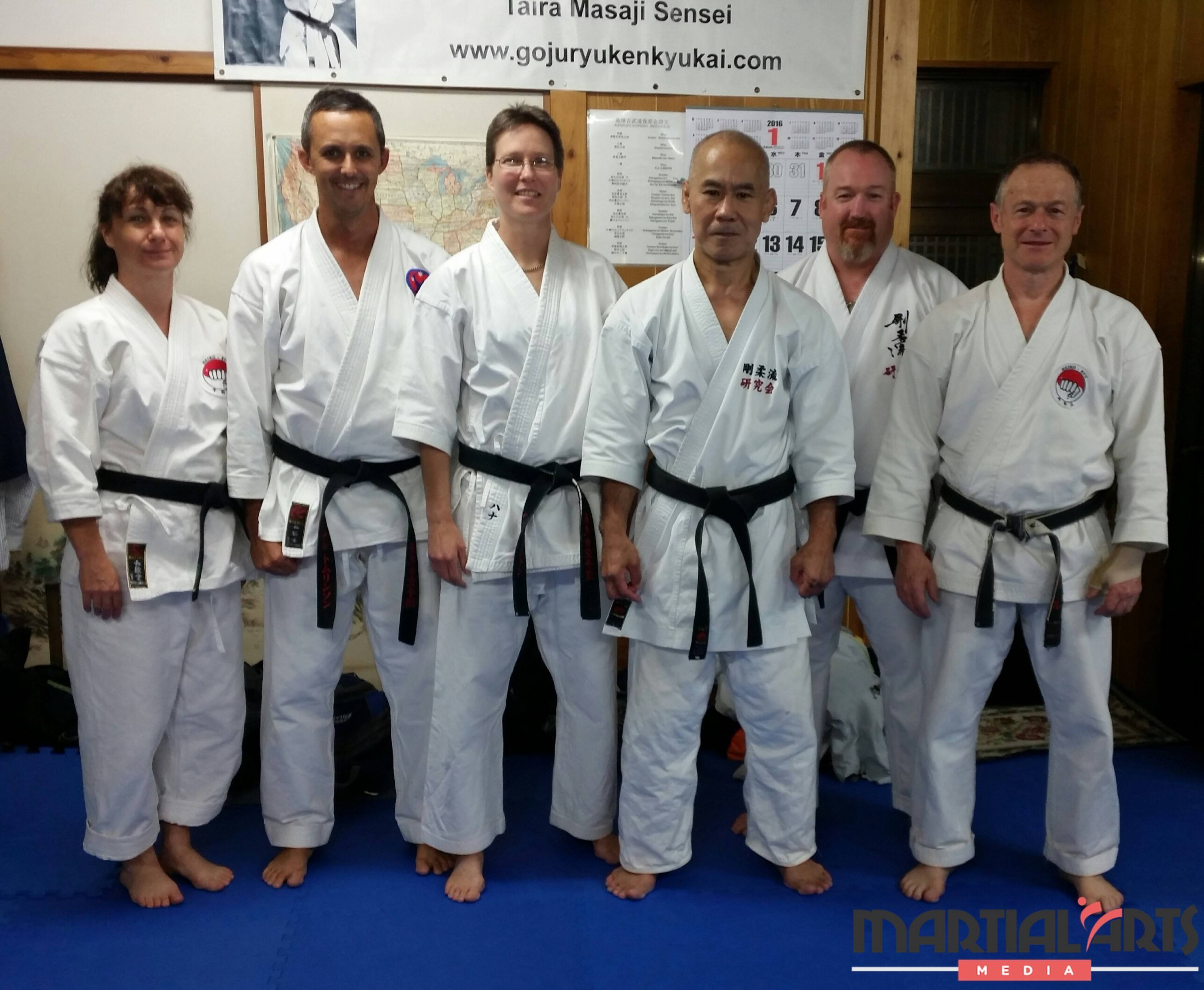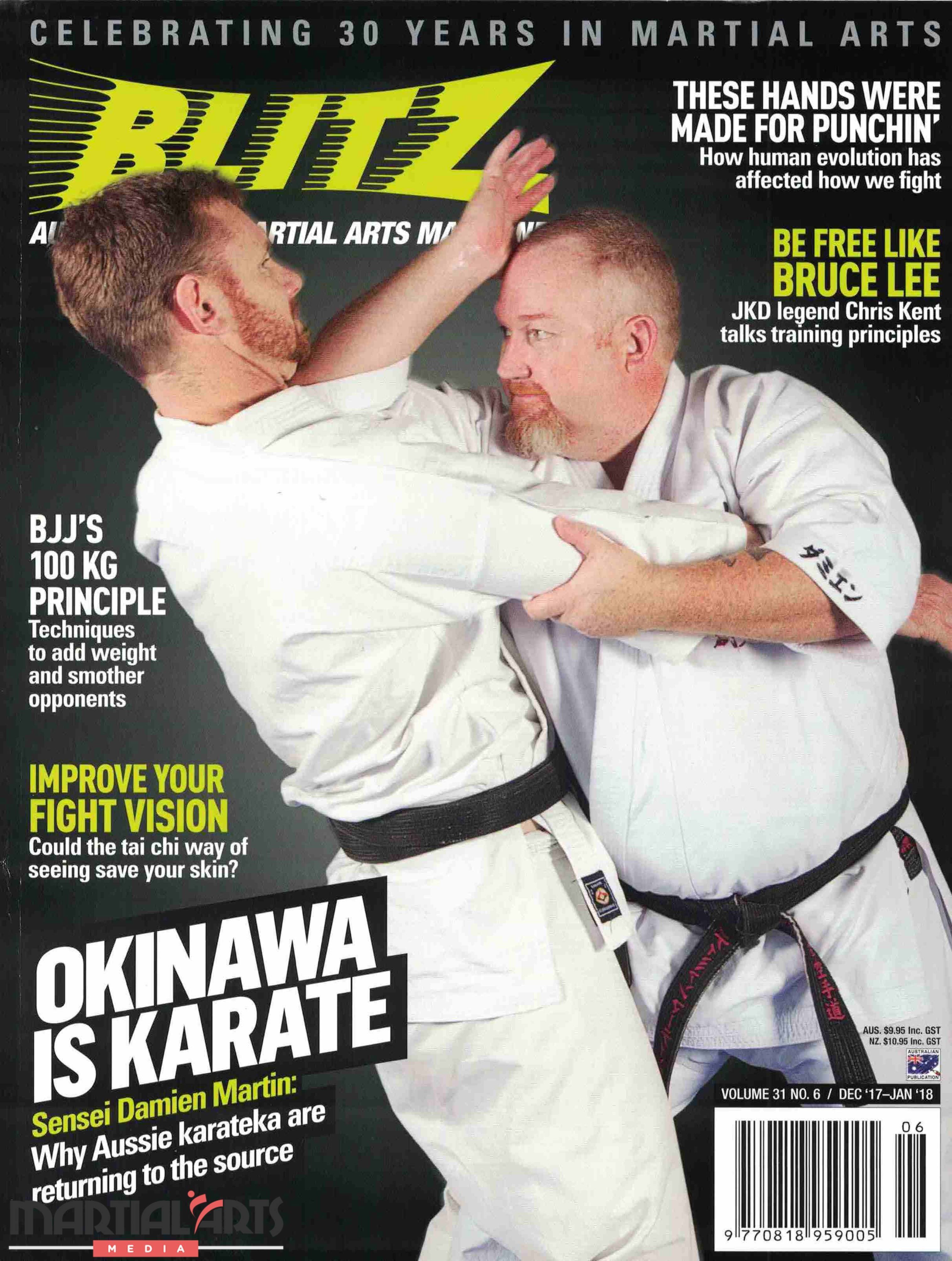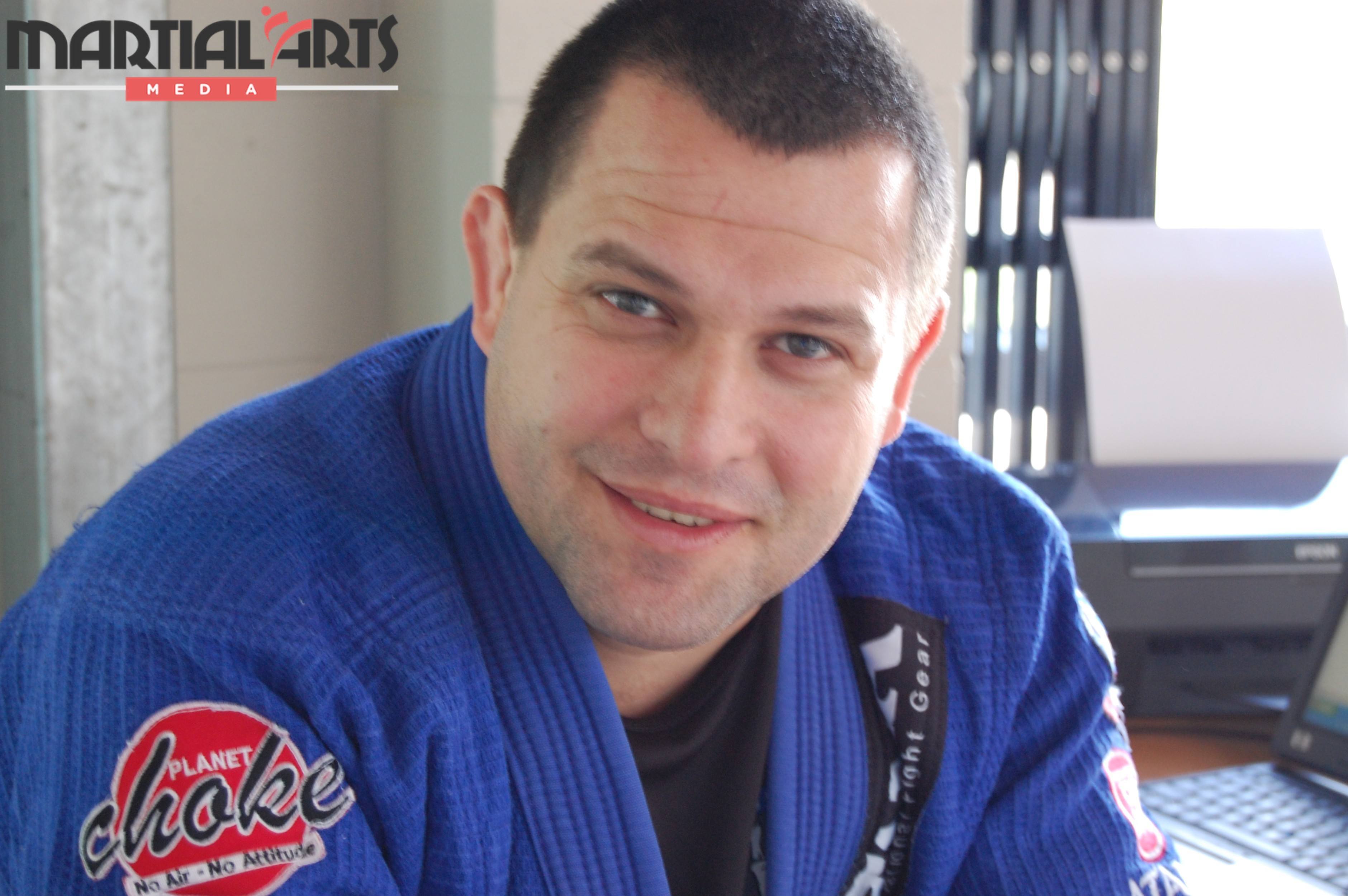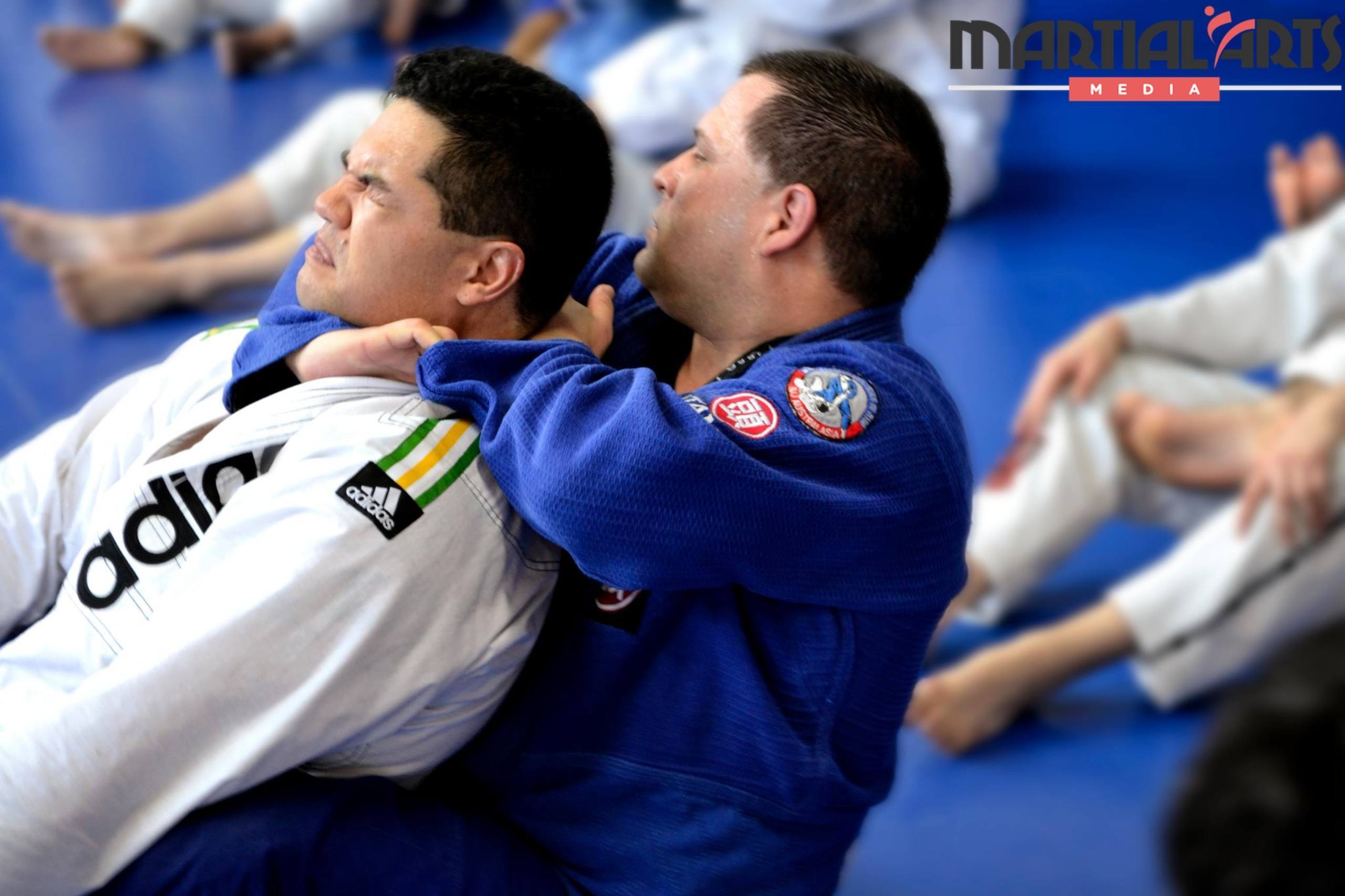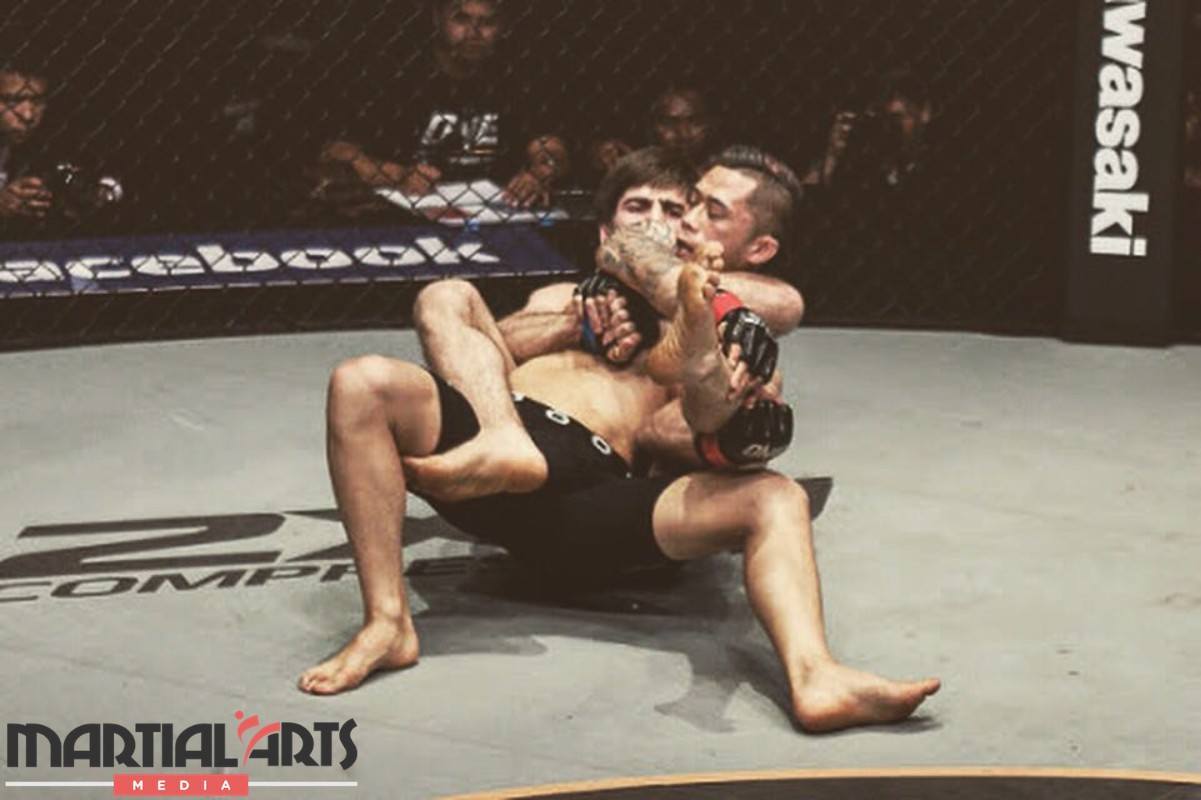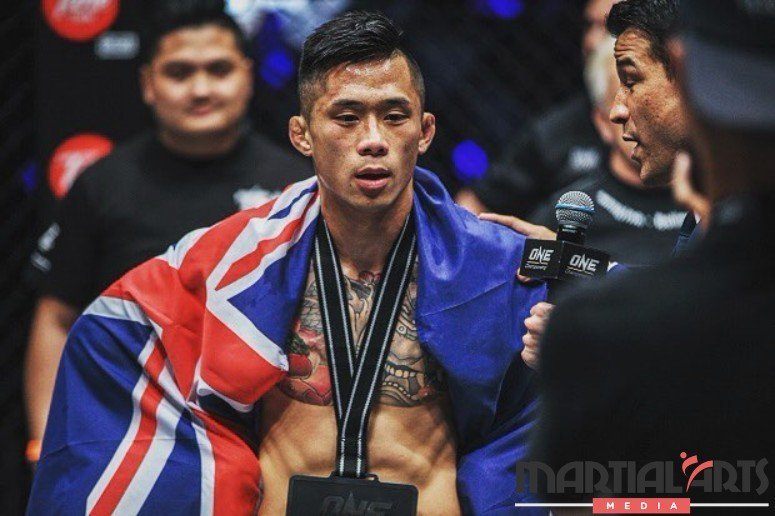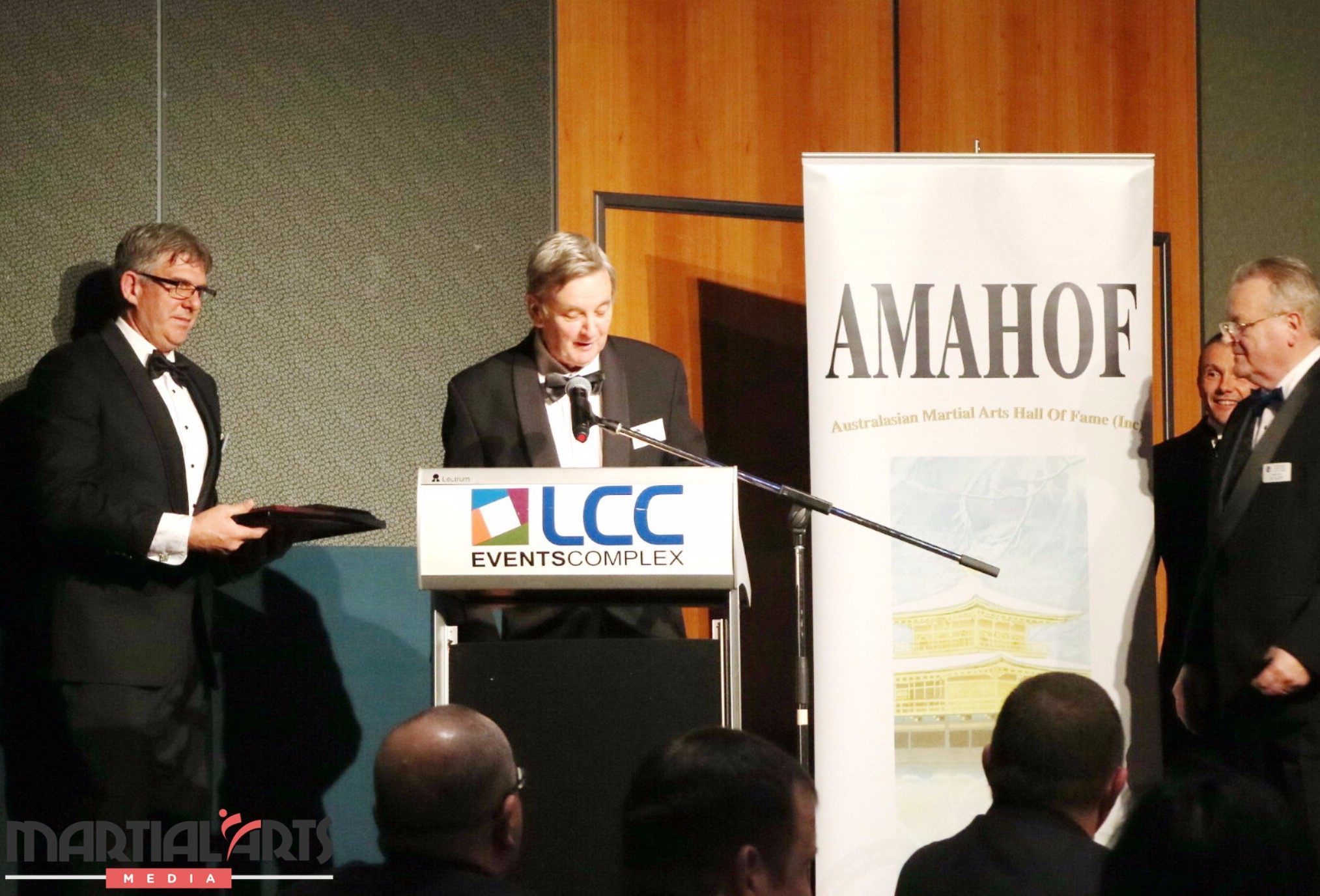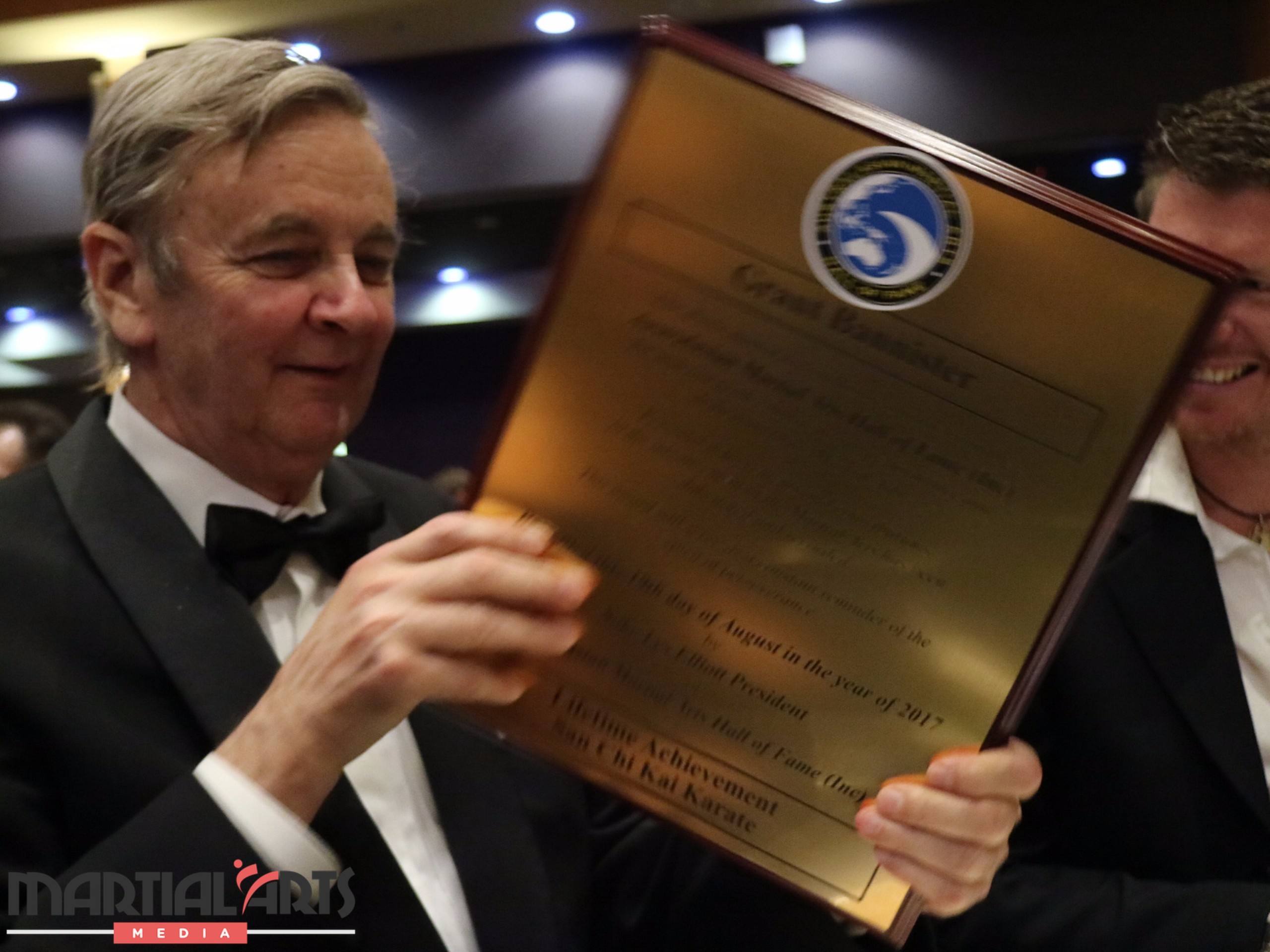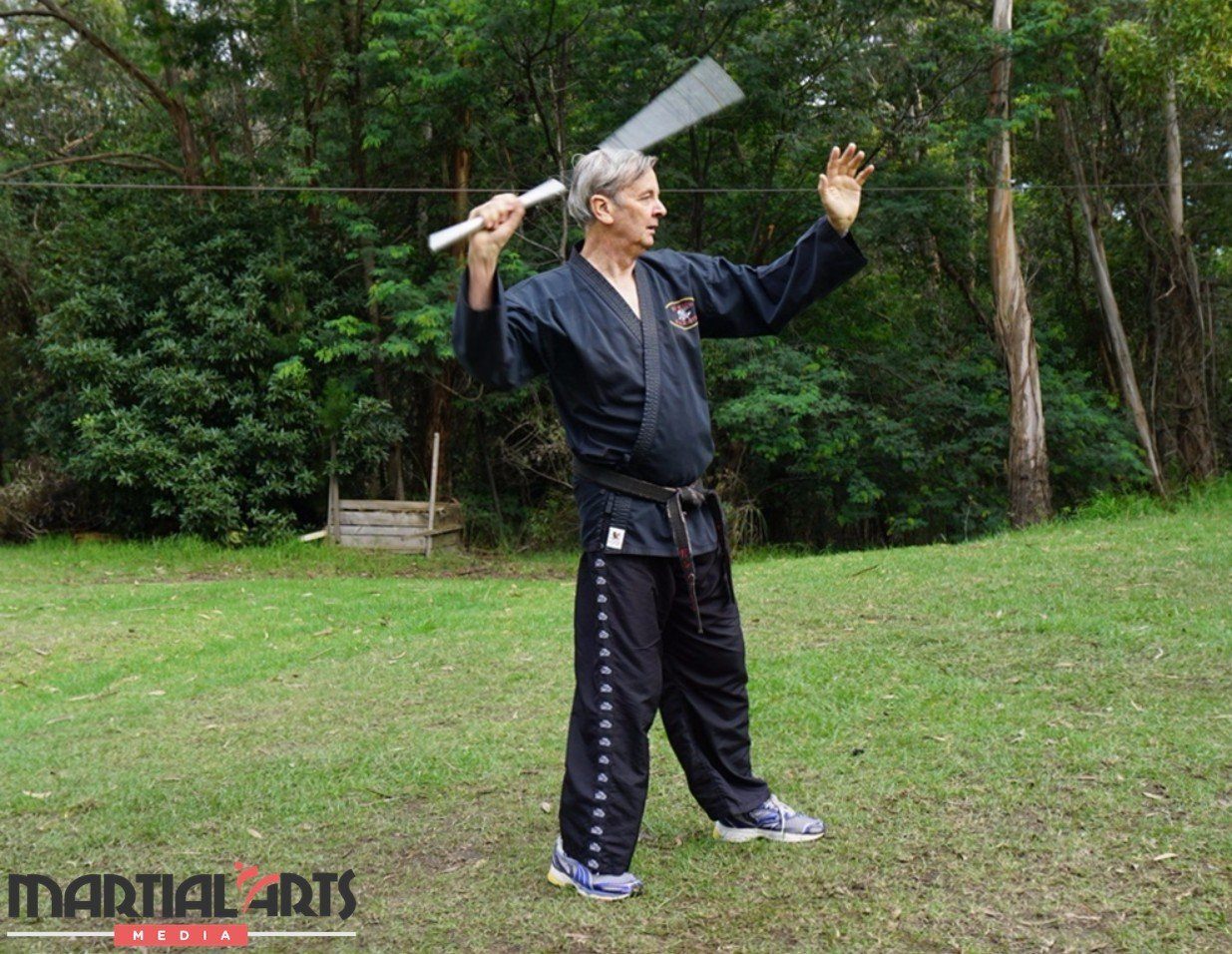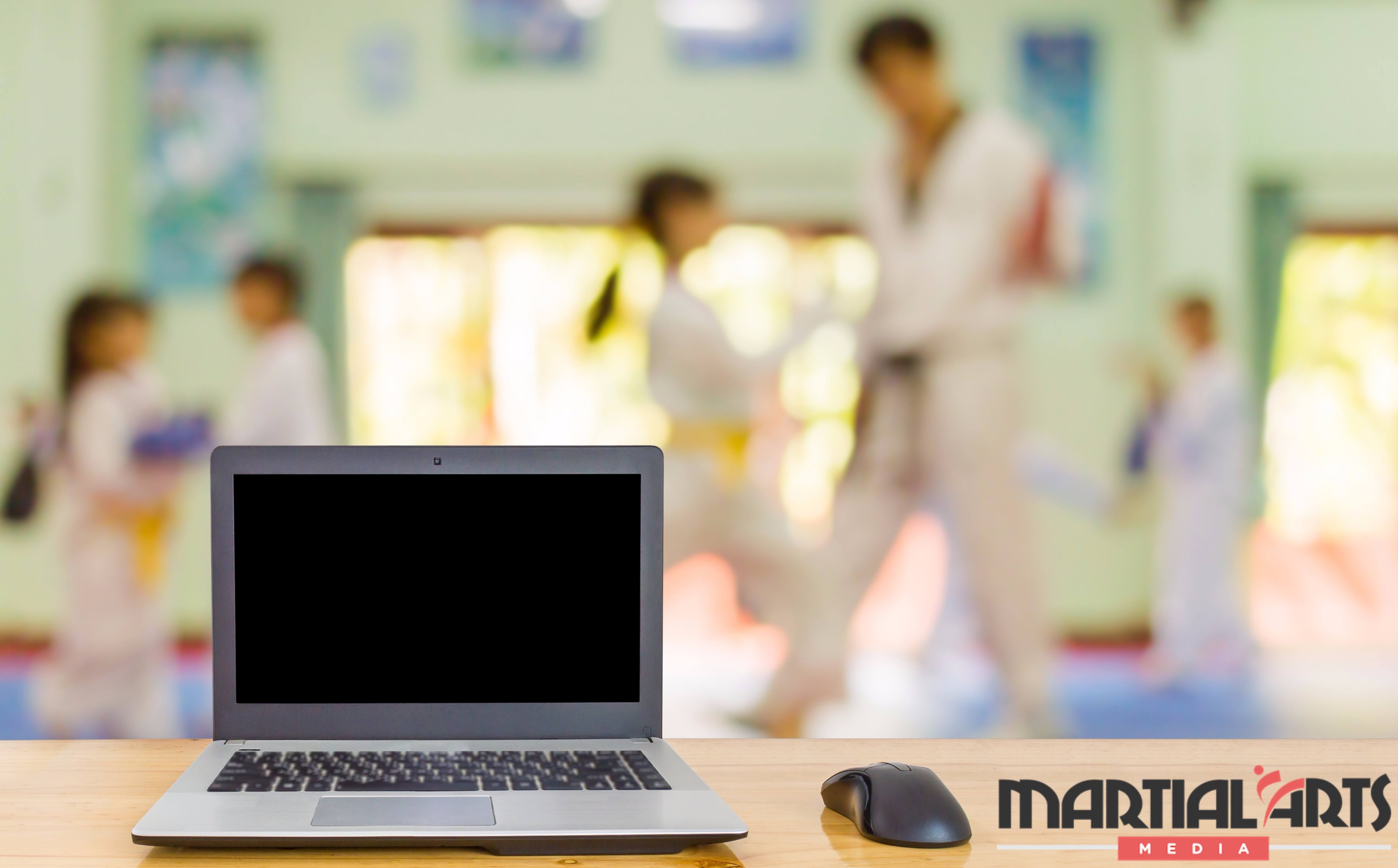Australian Girls in Gi's founder Jess Fraser catches up with George Fourie about mindset, hiring islands, events and more.
- What made Jess Fraser compete professionally again
- Injured and unprepared, how Jess was able to win the Abu Dhabi trials
- Optimism is a key to success
- Renting an entire island for an Australian Girls in Gi Event
- How Jess empowers women through martial arts
- And more
*Need help growing your martial arts school? Learn More Here.
TRANSCRIPTION
I sort of start the seminar with that. I'm Jess Fraser and I'm good at Jiu Jitsu. I might not be good at life stuff, but I'm good at Jiu Jitsu and I'm here to share that with you. And I'm OK with that now and I think that it's important for, definitely the women in the room to hear me say that.
You're listening to the audio version of the video interview for the Martial Arts Media business podcast, that took place on martialartsmedia.com for the full episode to watch the video, to download the transcript and see all the pretty pictures, you can go to martialartsmedia.com/59, that's the numbers 5-9. Thanks, enjoy the show.
GEORGE: Hey, this is George Fourie and welcome to another Martial Arts Media business podcast. I have a repeat guest with me today, Jess Fraser – how are you doing today Jess?
JESS: I'm doing good, welcome to my living room!
GEORGE: Awesome! Welcome to my semi-decorated office.
JESS: Yeah, I was just saying, I had some banners too, but I feel like this is a much more natural setting, you know?
GEORGE: Exactly! Well, natural behind me would not look that natural, so, we’ll just leave it at that. Well, welcome back to the show. It's been quite a journey. We are in the 50s, we are not sure where this episode is going to lie in numbers, but the last time we spoke to you was episode 13 and if you want to have a listen to that, martialartsmedia.com/13. And lots has happened in your Jiu-Jitsu journey and your events and everything so it's going to be great to catch up. And I do recall the last time we spoke, you were a bit of a nomad. You were travelling the world, basically training in and living in different locations and doing all that.
JESS: Yeah.
GEORGE: So I guess, perhaps that's a good point to start: what's changed, what's been happening in the life of Jess?
JESS: Oh wow. Heaps, you know. Last time we spoke, I think was like just over a year ago, so sort of just before camp last year. So that's what I do, I run Australian Girls in Gi and each year, I run a massive summer camp, so Australian summer being January, February, well, December, January, February. And so last year it was in January and this year it was in February, so I just finished another one. So last time we spoke, we were heading into one and I've done two since then.
So that's like routine thing that I do every year and again, and aside from that – I actually weirdly went back and traveled to the same places that I traveled to, I had just traveled to two years ago. So yeah, I kind of revisited Canada, America, went back to New York, trained at Marcelo’s again, saw Paul Schreiner, all that kind of stuff. So the year was sort of a repeat, but in so many different ways and definitely, last time I spoke to you guys – I do invite you to listen to the other podcast, the first one that we did, because I did this morning, just to make sure that I wouldn't totally repeat myself because I tend to, you know.

Black belts get the same stories, they tell them over and over again and I've become one of them. Last time I spoke, I was using the language of, I’m 37 and I'm old and I'm broken and the competition is over for me and I think that sat in my mind a lot after we spoke. But not because of how we spoke, it was just something that I was thinking about a lot at the time and then I ran my camp and that was really exciting, we had such a great time, the January camp last year and it was very successful and it was the last one that I will hold in Victoria.
So it was kind of a farewell to that campsite, which was fun. And during that, all of the coaches that I hired – so there are some really elite women here obviously, that are winning world championships and stuff overseas and I, of course, asked them to come onboard to showcase their coaching and information and technique and stuff at camps every year.
So during camp, all of those women went off to do the Abu Dhabi trials, so I was sort of, I was in this situation where I've sort of become the mom and the kids were going out to play and it was hard, you know. I wasn't jealous, but it was just like, oh shit, I really love Jiu-Jitsu and I used to be a competitor and I wish I was there but I'm doing this thing for the community and value both really highly and you know, I sort of sat with that for a while, trying to be OK with that, like my friends going away and winning the trials and then they're coming back and joining me and I just wanted to sort of be them. I wanted to be able to attend and compete and do everything.
So yeah, like a couple of weeks later, I was asked to go up to Sydney to help Hope Douglass prepare for a Copa Podio. So I'm a little bit bigger than her and I'm smaller than her – shorter, bigger. But I've got a really aggressive Jiu-Jitsu style, so I went up there and helped her out with her prep for Copa Podio. And we’re wrestling, you know, and I kind of, I was awake at 2 o'clock in the morning just thinking, why am I retired? Why have I done this, if I'm totally able to help other people still prepare and I'm the go-to, people pick up the phone to call me to go help them.
I just sort of had this feeling, a couple of things came together. Years and years ago, I used to be a smoker and my sister helped me quit, by giving me this one sentence that I clung to like a buoy in the ocean, you know? And it was, if you just don't have one more cigarette, just don't have the next one, you're just no longer a smoker. And that's how I quit, right?
GEORGE: Exactly how I quit!
JESS: Really? That's cool!
GEORGE: Yeah, the thing was, avoid the first cigarette. That was…
JESS: Just that one! You don't have to climb the mountain, you just have to avoid that one that's coming. So yeah, I sort of realized that if I just don't do another comp, I'm retired and it was something horrid in the middle of the night that woke me up, you know? And I just don't want to be, I just don't want to be! So in the middle of the night, I entered the Abu Dhabi trials and I think that was the Monday morning, 2 o'clock in the morning and the trials were the next Sunday and I hadn't competed and I was pretty out of shape. I wasn't fully back from the injury, I actually hurt the other bicep.
And then the next day, I'm rolling with Hope and she's asking me to do a certain guard pull because we knew that the woman she was fighting would do that. And I did it and I broke my toe, big toe. So I had a broken toe and I’d entered my first comp since almost two years because of the injuries and stuff. And it was my first comp, I think at black belt… yeah, it would have been. So all sorts of stupidity in that 2am decision, I came back to Melbourne and was training with my coach Martin Gonzalez again at Vanguard and like I said to him also, I've entered the Abu Dhabi trials. And he was like, why? And I sort of, I broke into tears and I was like because if I don't do another tournament, I'm retired.
And he was quite honest with me, he was just saying, I've seen the best Jess Fraser and apparently, you're not the best Jess Fraser. And I can get you to any tournament you want in the world, but giving me four days notice is not the coolest. And you're injured, you know, so I was all crying, you don't believe in me and he does believe in me. It's just pretty hard to prepare for a comp in 4 days, you know?
So we had four days to kind of get OK. And basically, my game plan, all the other ladies, Meghan had just fought Mackenzie Dern at the Japan Abu Dhabi grand slam, ended up in the final with her. And I also was aware of Kate Wilson going to be at the trials too. Kate Wilson was then a brown belt but is now a black belt and she's incredible. She's done really well internationally – I think she came in second at World’s as a brown belt and yeah, just generally a really good competitor, a prolific competitor. I see her all over the place, Japan open, that sort of stuff.
So there was a bunch of women in the Abu Dhabi trials for me and Sydney, because I missed the Melbourne one, teaching camp. And there was a bunch of women that were going to be a problem, you know? They're really good, they're winning international stuff. So I sort of went into the Abu Dhabi trials using more strategy than I've ever used before. My style is very aggressive and requires a lot of athleticism and I knew I didn't have the gas tank for it. So we just prepared essentially and mentally about how I was going to do things and basically, my coach said, look, you need to get OK with the fact that you're not going to bash these people. You're not going to win perfectly, you just need to win the matches.
So I did exactly that, and I won the trials, which was insane! It was just insane, you go into this tournament unprepared and it was a real risk for me emotionally and kind of ego-wise, you know? Because I hadn't been dominated in matches in Australia before and it was a very real risk, just where I was at. And I think that if I had it played like I usually played, I would have got beat up pretty good.
So I won the trials and then sought out the advice of one of the guys. I brought James Tomlinson to my camp last year. He's a strength and conditioning coach and also a black belt in Jiu-Jitsu. I brought him into the camp in Melbourne to advise women on cross training for Jiu Jitsu. Cross training, not like the new gym, cross training strength and conditioning, longevity in the sport and I thought, OK, well practice what you preach. If you're going to tell the ladies to listen to him, you should listen to him.
So I sought out his services and we started working immediately on preparing for Abu Dhabi. And straight away, the things that he made me stop doing were some dietary things, but also he legitimately made me stop using the language of old and broken. Broken was the really big one that he was like, yep, no more. We don't speak like that because you're not old and you're not broken and we’re going to meddle in Abu Dhabi. And I was a bit like, whatever, I just want to turn up. I've not retired anymore, I'm excited.
So when I got to him, my right bicep was in trouble and the left bicep the long head is actually missing, so I considered myself broken for sure and he not only took me from injury to health; he took me beyond to the fittest I've ever been. And that was quite a process. And then we went to Abu Dhabi and I would say for all of my Jiu Jitsu career, I've been discussing myself like… I've been discussing sort of belts in a way, I think there's like the belt, there's the whole belt, and there's… say there are all the blue belts here. And then there's a big gap and there are the competitors, they just feel different, but they're still blue belts, it's a weird thing. They're the top of that and they're kind of a very different vibe to the majority of blue belts, but they're not a purple belt. It's a weird thing.

And all of my career, I've always said that I'm not here in the belt, I know I’m up here, but I think I'm the bottom internationally of this, you know? And people go, no, you're better than that, believe in yourself, whatever. I feel like I'm very realistic in my self-evaluation and I was pretty certain that that's where I was internationally at every belt rank, including the black belt.
So my job was not to win, but my job was to prove that to myself. So I was certain that I wouldn't even hit the podium and was terrified of allowing myself even to think that way, just mainly because I was scared of disappointment, or having to redefine myself if I didn't. And that fear I think limits you in competition, you need to actually believe that you will win it and just deal with the fact that you might be disappointed if you don't because a couple of tears is a lot better than limiting yourself I think. So J.T. from Richmond gym, that really got me back into a better headspace. He was really into me about this stuff and I never thought about it this way before.
So he was very into me with that, he was into me about thinking in a positive way, so there's a lot of stuff that I thought I was a realist or whatever, I understand where I'm going to come in the matches and he kind of got me outside of that headspace, you know? But he also… Stuff that I sort of rode off as just motivational quotes, things like only positive vibes, you know? And I now know how essential they are. For me, there's only progress in joy, you know? And he helped me move away from things that were making me feel really negative about myself or others and just stopped those things.
There was a lot of things where he was like, no more bad vibes. Just no more bad vibes, you've got to be happy, you know? And that just literally saw me soaring, right? The fittest I've ever been, the best I've ever rolled and I went to Abu Dhabi very prepared, like crazy prepared. I was prepared for 15-minute matches, you know? But it's, Abu Dhabi is short matches, which is really suitable for somebody like me that's really well into masters two or something, I don't know, age of 38-39 now.
So I went over in the adult's division and I fought really well and then hit Tammi Musumeci in the semifinals and I swept her, which I don't know whether has been done yet, you know? So there was that moment of like, holy shit! Oh my God! These people, they're exceptional and they're kind of unbeatable, but the techniques are beatable, so if I can just get my best spots… If you apply them, they work, you know? But if she gets the hit, it works for me too, you know? So I swept her and then I made some bad decisions about where I went after that. And she berimboloed me, she's best in the world in berimbolo, took my back and then choked me, which I would love for that to not have happened, but it was the first time that I realized that we could do this, I can do this. And it's totally possible.
So the cool thing about Abu Dhabi… So she went on to the final the next day against Bia Mesquita and so… incredible athletes, the best in the world and I just missed out. So the cool thing about Abu Dhabi is you go back into this new division, they created a whole new division for anybody that didn't get through to those two final spots. So you start a whole new comp and I ended up winning that. So my bronze medal wasn't because I’d lost to somebody that won. I went into another comp and I won that little comp and so that was on the big screen on the final day and stuff, so I got to be the first Australian black belt to go onto the final day, which was just the coolest thing, you know?
The difference between that, I've been on that finals day before as a purple belt and it was televised and stuff and I had a panic attack from the first trip to the end of the match, so it took me years to be able to watch the match, because I was just so overwhelmed by it, it was very overwhelming, the cameras and all that kind of stuff. But I'm so glad I had that experience at purple, because then as a black belt, I just enjoyed every second, you know?
Not only was I thinking I was going to retire last year, I was like standing there, even for the final day, there was a moment where we’re all standing in the dark with all the lights going, the drums going and I was looking across and I could see Livia Gluchowska waiting for her match and I could see Lachlan Giles waiting for his match and it was just like we were these terracotta army standing in the dark, it was just the coolest thing! And then the music and the lights came up, and then the wrestle did this all once and it was just… there was that moment where I was like, this is the coolest thing I've ever done in my life.
This is awesome and it was the first time in my life I enjoyed competition because it was just so cool! I've been terrified of competition and nervous and terrified of performance and all that kind of stuff in the past, but this thing was just a celebration of all the years leading up. It was just all of it, you know? Everything put in and all the people that had helped me and stuff. And I think it really goes to show that the joy really can bring the best out of you, you know?
The final day was just awesome, cool things happened. They announced me as Jess Fraser from New Zealand and that made me think instantly of my best mate in New Zealand, who's been on this whole journey with me Kirsty Mather and she's just opened the first gym in the South Island and I think in all of New Zealand to be owned by a woman, owned and operated by a woman and that's just… so instantly, as soon as they said it, Jess Fraser from New Zealand, I was just in a great space!
Because I thought of all these people I love out there with me and I knew that they'll be laughing, watching the live feed and it was just the coolest thing. Lachlan Giles volunteered – he's from a different gym, you know, we don't train together, but he's from the same city and he volunteered to be my coach from the sidelines and so I was out there with people from Oz and then I won that match and the bronze medal and… if you've seen the video, it's just the happiest I've ever been in my life. And even talking about it now, it was just…
GEORGE: You were happy!
JESS: It was just the coolest thing! I can't even put it into words how great it was. And it validated for me like I was talking about: there are the black belts and there's the gap and then there are the competitors and I am the bottom of that. And I'm good with that! The girls that are the top of that – I look up to! But I'm off them, so it's just really validating and just… yeah, I'm really happy about all of it. Liv Gluchowska also won a bronze medal that weekend and so we’re the first, we’re blazing trails. We did it blue belt and now we are black belts, so that's a pretty cool thing. And then, off the back of that, I kept the momentum going and I went to worlds and did my first black belt worlds. And I lost first round, but again, I just had so much fun.
There wasn't a whiff of nerves, it was just all about getting to go row with the woman that's really good at Jiu Jitsu and see what happens. And I dominated the match but lost some points and definitely, it's a strategy problem for me. I just want to fight and have fun and I had reverted back to just wrestling. And I just couldn't get a hook when I was on her back – good on her for protecting it. So her strategy was better and I might have been a bit more aggressive, but whatever.

But I had a lot of fun and then, I decided to do No Gi worlds because I figured this was probably me peaking, you know? At 38 and I went black belt and I've never done an international tournament in No Gi and I decided to do that, mainly… that choice was mainly I'm moving into coaching for sure and that's really where my future is. And I feel like the sport is moving in a direction – and I say the sport, because I don't mean the martial arts part of it, but the sport is kind of moving in a direction of No Gi and a lot of the people that come into the sport have done so, because of the UFC and looking at things like Eddie Bravo’s tournaments and there's money in those tournaments and people are interested in No Gi and I felt like I would limit myself as a coach if I didn't understand it more.
So I took the Gi off for four months and had problems with the most challenging four months I've had on the mat since blue belt, really frustrating. There's was quite a few tears, it really took me back to that space of getting my ego smashed, you know, because there's a bunch of guys that I can handle fine in a Gi that I couldn't in No Gi, so that was really difficult and challenging in so many ways. Preparing for a ten-minute match at the age of 38, or several 10-minute matches in No Gi as well – aaah, it's like… it’s very physical, you know?
So that was really hard and I think that a lot of the fatigue really got to me as well. It didn’t really help my headspace resolve. So I prepared for that and then went over in December, and I did kind of a de-load victory with Dean Lister and stuff and that was really cool. Dean Lister was one of the most giving people on the mat, he just helped me out so much and he could see that I was struggling with performance anxiety and it was like, I think you just put a Gi on! Just come down here and have fun. Just the coolest thing to have this legend say, just chill out Jess. Don't worry about it, it's just another match.
And so that really helped me. He showed me some really cool stuff, made my game a bit broader as well, and I'm working on that stuff now. And yeah, and then I went and I took 3rd again, so it's really proven to me that there are some elite women and I just think they're crazy crazy crazy good, I'm hanging with them; I'm not beating them, but I'm there. And that in Gi and No Gi has sort of proven in a year that I thought I had retired, so I'm really happy. I couldn't be happier and it's changed my view of myself and what's possible in the sport and… yeah. Yeah, it's been a big year since I saw you.
GEORGE: That's awesome! And you keep referring back to the mind thing. And that's sort of the one, you're obviously capable of all the achievements that you've got, there's this pattern that you keep talking about, your mind is playing tricks on you, you're talking about, you're broken and you know…
JESS: Yeah.
GEORGE: …the age thing, you know, all this mental stuff going on.
JESS: Yeah.
GEORGE: Do you find that being the hardest thing with just Jiu Jitsu and everything in life, just really managing that mind, the mindset to actually take you to where you need to go.

JESS: Yeah, I mean, the hard thing is identifying it, you know? I didn't even know I was using that language. I had no idea, I kept saying it and I listened back to the podcast and I hear it and it's shocking to me, how often I did it. And sometimes it takes somebody on the outside to say, hey, you really need to pull up on that stuff, because it's not great. I’m now, I'm really moving as many people as I can away from things like black belt spaz, I'm just not into the language of it, we just use different language at our gym.
Don't be a potato, it's totally inclusive language, and it helps not shame people and just… bad language can be really powerful, you know? And I know there are even people who call me up on being pc police, you can't say anything these days – but it's powerful, you know? If I keep telling myself that I'm a spaz – what a horrible thing to say! Or somebody else is and just the way that we see ourselves. You are what you repeat in behaviour.
GEORGE: Yeah.
JESS: And you are what your practice, you know? So it's important that you practice positive thought and process it if you want to do well. For me, I feel like it's essential. I couldn't have done what I did without it, I understand that now.
GEORGE: Yeah. I mean, and it's a big balance because you can't just have a positive mindset and do squat on the backend. But I mean, I'm having this conversation with quite a few people in our Martial Arts Media Academy program, which helps the school owners with their lead generation and so forth. And the conversation is always going, the focus is always on failure and it's just… I sparked a conversation with a few people, very negative outlook towards themselves and their results and a real skewed version of… I guess taking it very personally? Very small obstacles, turning it into big things and then reflecting that on themselves for the failure. And I mean, it's really hard to get that message across, but my message in its simplicity was, no one's ever been successful thinking of failure. You can't be looking there and expecting to go there.
JESS: Totally. Yeah.
GEORGE: Two opposite sides of the coin.
JESS: Exactly. Years ago, when I tried to play ice hockey, a really simple statement from the coach is, you've got to look where you want the puck to go – not at the puck, you know? In that self-reflection, don't be the puck in front of you, you know? Look at the goals and that sort of stuff. And I really used to write that stuff off, I think my cynicism or something wouldn't allow me to let that in and I see it now, you know? And it is powerful, it helps. Everything helps, you know?
If the difference between me and being in a final with these women, potentially in the future if I could, if the difference is that, why not just try it, you know? it's not going to hurt anything and it's not going to make you exhausted in any way, you know? It's not having to do sprints; it's something that you can do without it being at cost to you or anyone else. It worked for me, I don't know, might as well try, you know?
GEORGE: It's important that you also mentioned that you had some of this fail-safe thing happening, that you want to be realistic because you don't want to be disappointed as well, so you don't want to put… it's almost like you're holding yourself back, right? Because you don't want to put yourself out there, like in the mindset, I'm going to win this, I'm going to win this and then you don't and you're crushed afterwards.
JESS: Yeah, but some people do. Some people do and I see a lot of affirmations and stuff, and people writing that sort of stuff and that's cool. Whatever they need to do to get that positive thought patterning in, of thinking as if they can win it. There are some people that are just like, I think that I am a winner and I believe – for me, I'm not there yet. I don't know how to think that way, but what I needed to do was just not block myself. So I'm thinking more in the way of, it is possible for me. It is possible. If I do everything right, this is possible, you know?
And the way that… for some reason, I think that in Abu Dhabi I had this… it was like my ears equalizing, popping to the logic of, oh, I have 50% chance of winning this thing tomorrow. Tomorrow, when I go – and this was even before the final day, but I had nerves going over and whatever and just going into the division I was like, but one of us is going to win that match! I’ve just got to do everything in my power to make it be me! And if that's not enough, that's cool too, you know?
The first day of getting into the bronze medal match on the finals day, that's what cleared it for me. Oh wow, it was like a real realization and I finally believed it and understood it. And I was like, well, one of us is going to get what we want tomorrow – just make it be you, you know? And then when I went into the finals day, which, of course, you're trying to get some sleep and you're freaking out because it's the first time an Ozzie has done it, a black belt and the thing… I ended up finding my sister and just saying like, I'm kind of terrified of letting myself think that it could be me, you know? And she was like, what?! Just think that way! You know, just do it, allow it.
And I remember the moment, I just like… it was really emotional for me. I was like, oh my God: I might actually get to have this. I might get to do something that I really wanted to do and it's OK that I think that way, you know? We sort of getting told a lot to be humble in this sport and I think that I went, if there was a grayscale of it, I think I went so far the other way, like never… I didn't want people to perceive me to be like cocky or whatever, you know? But now I realize that at some point you're going to have to. You're going to have to think that you're good at this thing, you know?

And now, I really test myself. When I go and do seminars internationally, you know, I sort of start the seminar with that. My name is Jess Fraser and I'm good at Jiu Jitsu. I might not be good at life stuff, but I'm good at Jiu Jitsu and I'm here to share that with you. And I'm OK with that now and I think that it's important for, definitely the women in the room to hear me say that and to say it just as a fact, not as a, woohoo, yay me, or anything weird; it's just, this is a fact. I’m good at it, I proved it, you know? And I'm OK with it. So that's part of my thing, I have to keep repeating that language.
GEORGE: So let's talk about your events because I was on your Facebook profile and I’ll include this photo in the transcript, of course.
JESS: Yeah, of course.
GEORGE: There's a picture of you with how many people are at this event? I mean…
JESS: So it's 153 women from all over Australia, New Zealand, Canada, Indonesia, and Cambodia and some international travelers that were already in Australia, so Germany and Switzerland and places like that. So they were lucky enough to get the timing right. 153 women in a whole island that I rented for us. So I booked a whole island this year, which is…
GEORGE: You booked a whole island, all right.
JESS: An island, yes. A whole island and it has no public access, so I had to charter a ferry for 153 people to get onto and arrive at the camp. So I've got some drone footage around, that's floating around so you guys can see that if you want to have a look, I'm still in the throes of editing a lot for announcing the next years’ one.
But yeah, I started those camps in 2011, so this was my 8th, 8.5 – I did a mid-year camp that was a little bit smaller in Melbourne. So yeah, that was my 8th one and we had I think, and I'm not meant to call them staff, because of contracting laws, I call them crew, right? So I had 20 crew this year. We had 4 main coaches, we had something like 10 assistant coaches and they're women that have attended camps before and are elite athletes in Australia and from Hong Kong as well. So they're moving into the senior coaching roles.
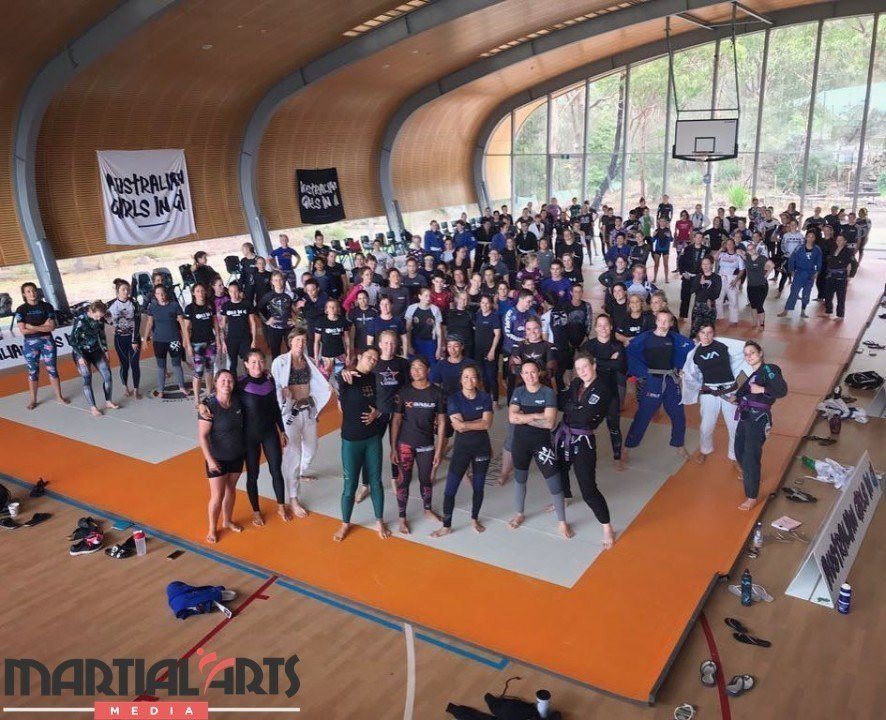
The cool thing about that is creating employment for women within this sport and – I'm not allowed to say employment, you know what I mean though. Contract work, but yeah, so heaps of opportunities there, those opportunities you can apply for and stuff. And we now have somebody that is a full-time contractor for running the merch store, I’ve outsourced stuff like that, to a woman named Helina Jade, who is just a Godsend. She's amazing, she does like the whole thing for me, so she's actually working for AGIG now, so that's really cool.
But yeah, 153 women are on an island for three days, we caught the ferry out there and then just heaps of training and heaps of activities, so there's a lot of social activities for people to just have a good time. And it's kind of like… this one was kind of like a music festival, there were so many crazy, fun things to do and like costume parties and just cool stuff. But a lot of training, you know, so people mainly see the photos of us fooling around, because those are the amusing ones, but there was something like 12 hours of contact with training over a three day period, so it's a lot of training. That means we need a lot of down times, splashing around in a pool and that kind of stuff. So it was incredible, I think that's the first time that that's ever happened, that somebody… yeah, owned a whole island for Jiu Jitsu, and of course for women, it was crazy. So a 153 is pretty big, pretty big. I was very proud of that one, a real success, yeah.
GEORGE: Why is there no Australian guys in Gis doing a thing like this?
JESS: Yeah, I mean, this sort of comes back to my… every year at camp, I set an intention that is of course flavored by where I'm at in my own journey and I like to share that with people. I’m very open about that sort of stuff, I like them to see truly who I am and my ideals and stuff and if they're aligned with that, that's cool, and if they're not – that's cool too, you know? And so over the last two years, there's been quite a bit of backlash against feminism just generally, people think it's a dirty word, or a bad movement or something. And there's some confusion about what it is and what we’re trying to do and I think there's some confusion when it comes to Australian Girls in Gi, guys going, oh, that's sexist. Well, it's sort of not and to help people understand that, I kind of wrapped up in my theme for the year.
Every year, I set a theme for the AGIG camp and I try to get it to flavor the year ahead for all the Australian Girls in Gi, members. So in the past, we've done things like tackling comparison envy and just not comparing yourself to other women, not trying to drag them down as a way to balance that for yourself, you know? Celebrating women, one of our intentions was, become her biggest cheerleader and it's very easy. Once you see somebody that you're jealous of, it's very easy to become her biggest fan and it actually is for you, you know? So we've done that sort of thing, body acceptance, we've done learning how to learn, all this kind of stuff.
And this year, because people have been approaching me about this thing, well but it's not fair, it's only for women and that shouldn't be allowed and that's not legal and all this kind of stuff. And it is and what we’re doing is celebrating the women that are already in the sport. So we’re not saying that men… we don't want to be divisive, I don't know the word, in any way. I don't want to create a divide, I truly don't want to. I don't do it at my own academy, so I don't want to take that into the community, but the idea is to celebrate the women that are already in the sport and to encourage them to stay, so they can move into… who have stayed long enough to move into roles of leadership and community development and all this kind of stuff, you know? And then make it truly an equal sport, an inclusive sport, you know.
So the idea for me, I was just talking about the punk posters on my wall, it's like I started thinking of the riot grrrl movement of the 1990s and Kathleen Hanna, who is the lead singer of Bikini Kills, sort of started this thing called riot grrrl and basically, you know, at gigs, it wasn't about making sure that the men left or anything, but she did say this statement, girls to the front. And she was, I’m serious about it, girls to the front. Bring them to the front, let's prioritize them within the community and then celebrate them and that's cool, that's totally cool. We’re not trying to create a divide, we’re trying to create more celebration of people that are involved. And that's totally what AGIG is and it's totally what the camp was about.
So I asked them to be those girls to the front this year. And to fill the space, you know. And to create within the community, so I'm really asking of them, rather than to just be participants to start creating, start making Jiu-Jitsu art, start making montages, learn how to be a videographer, learn how to be a coach, learn how run a kids event, you know? I think some people are a bit scared to take up space in women's Jiu-Jitsu in Australia because they feel AGIG is a bit of a juggernaut, but I'm really sort of saying – but I want you to, I want to attend an event. I don't do kids camps or anything, I don't do that sort of stuff, I focus on adult women, I'm celebrating the adult women that are in the sport because I want them to stay and I want THEM to foster the kids, you know? Foster their development or whatever, so it… for me, that's what the flavor of this camp is and it's really, it's really what the theme of the camp was.
The year ahead, I'm hoping that they’re really inspired and they do this stuff. One of my mates just wrote a Jiu-Jitsu rap song and he's doing really well, that's J.T. my strength coach, so seeing that sort of stuff, I just want more of it and I want more from the women, you know? Because I don't believe that the community is set in stone with how it can and should be. I believe that it's a malleable thing and if we want a space that's all-inclusive, we have to create it that way. And just simply being a participant doesn't change anything. You can't be a participant – sorry, my battery just died, you can't really… hello, are you there? Sorry.
GEORGE: Yeah, cool.
JESS: Yeah, so you can't really be a participant and complain about how it's being run if you haven't offered energy and alternatives. So that's what I'm asking of the community this year and to help explain to other people what I'm trying to do. I really, just genuinely am so excited about men in the sport as well, but this just happens to be where I'm focused on my business, you know? And my life, so – yeah.
GEORGE: I think it's awesome!
JESS: Thank you, yeah, that's awesome.And so for me the whole range, even the merch and stuff this year has a punk flavor to it, and there's a reason for it. It's to remind the girls daily, be a mat punk, fill the space, back in the day we used to make fanzines, you know? And I'm just not seeing that in this community, I’d love to see more blogs and I’d love to see more podcasts and that sort of stuff and that it be women, not just always a male voice. And that's not to say that the male voice isn't worthy and totally exceptional, you know? I totally see that, but it's just I want more, there's no… it won't detract from men if we add. It won't at all, so that's what I'm asking with Australian Girls in Gi.
GEORGE: That's awesome, I'm a big fan of what you're doing, I think it's awesome for the sport, I think you answered, you give answers to questions that I would ask and I think that your vision and creativity, it does a lot more good than it would do any divide or any harm. You’re simply making it OK for ladies to step up and do Jiu Jitsu, where they might not have felt comfortable in a male-dominated sport to do that.
JESS: For sure.
GEORGE: So just a few more questions for you: where are we headed with Australian Girls in Gi, and also which events are coming up, depending of course when the listener listens to this podcast. But what do you see happening in the near future?
JESS: Well, some cool things have happened. I've got a lot of advice about moving forward and last time I spoke to you, I was saying, I try not to focus too much on the competitions. And I sat down with some mentors and we looked at my strengths and weaknesses and got really realistic about that. And my strengths are definitely community and hands-on, physically rolling with people. I love doing that and things like the competitions were exhausting me and they weren't my forte, you know? I've always run good comps, but it's just not where my heart was.
So I've actually taken on Hope Douglass, who is a brown belt in Sydney and she's, along with her partner Ari, they've taken the Australian Girls in Gi comps, so they've created a whole season, they do Australia wide tour in Brisbane, Melbourne, Sydney and Perth. So that autumn tour is coming up and yeah, so it's essentially a circuit for comps and I'll be looking at overall winners and rewarding that in a certain way, from the community side of Australian Girls in Gi. So that's now her baby, it's sort of like, it's got a lot to do with me because I sort of started it, but it's now completely hers and she's running with it and where I'm really proud of that is not only the Australian Girls in Gi offers tournaments for women, so definitely girls and teens and masters now, in the masters division you really get to have matches with other women.
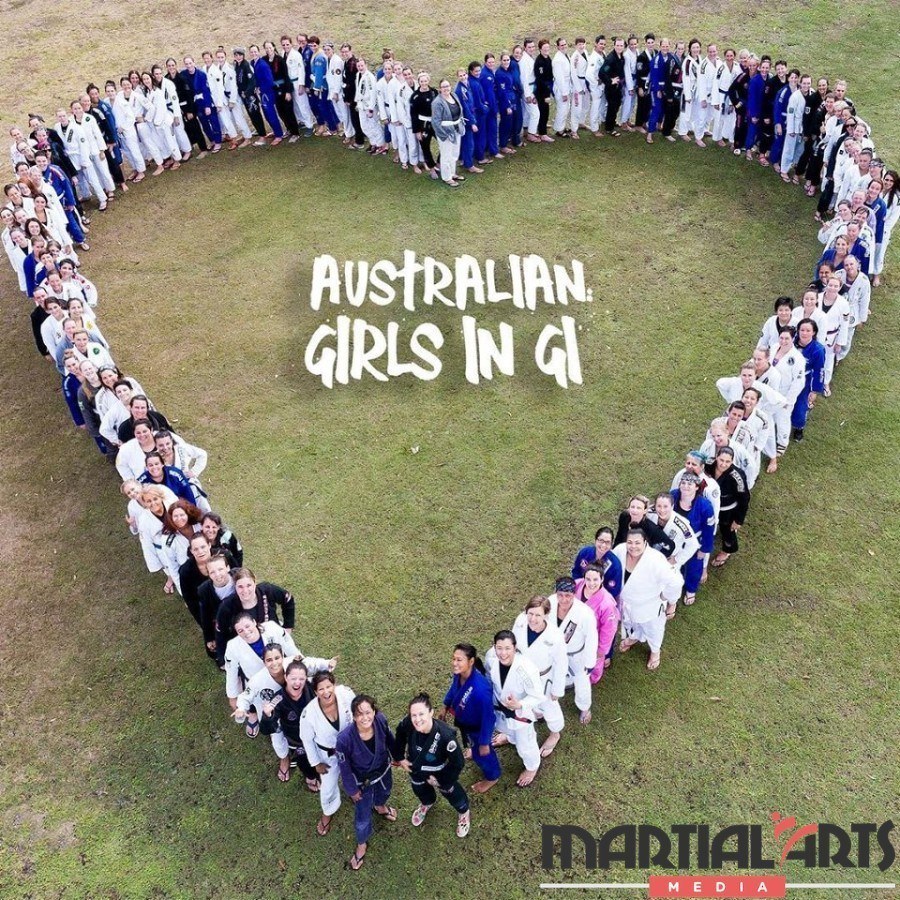
It's been handed over to someone, so I've also created an opportunity for Hope to be able to fund her overseas travel to go on to compete and that sort of stuff. Like, I can't afford personally to sponsor her, but I can create that kind of opportunity, and she's really run with that, it looks incredible. She does a better job than I ever did and I'm just really happy about that. Like, that's what I wanted, is to create more opportunities for women and I feel like if I try to do it all, I’d be sort of getting in the way of that, so it's really nice to be able to see that happen and flourish. So she's doing that, there are all of those tournaments are on the Australian Girls in Gi website, which is just australiangirlsingi.com and also on our Facebook page. So the Facebook page has got all the events listed as Facebook events and that's a really easy way to keep up to date for that, so they're coming up.
I’m running things like the open mats in a bunch of different areas, but there are also some other women taking on the open mats too, so Jean Alvisse in Wollongong. She's a black belt as well, and she's going to start running some open mats in New South Wales, under the banner of Australian Girls in Gi, so again, really introducing her to the community and sharing that one out, like outsourcing. Also, I can really focus more on the camp, so the open mats I will do where they're easy for me to do, I'm going to try to do an east coast series, I've just got like a whole bunch of gyms applying, they're all expressing their interest to host. So hopefully, we’ll work from Cairns all the way down and do a whole month of open mat series and some seminars.
So what I do is, I do an open mat in that area and use that essentially as a crowdsourcing fund, like a little pool of cash to afford me to be there and then I usually spend a couple of private lessons with the most senior woman there, that's the leader in that area. So it's like I'm trying to train them, kind of situation, where the people that come to the open mats, it's like a $30 open mat, but there's 30 of them, they can fund upskilling the local female leader, which just has a great flow effect. And then, once we've done that a couple of times, we sort of move her into a leadership brawl as well, from Australian Girls in Gi, so she might become an assistant coach at one of the camps, or what not.
So it really sort of, we've got like a process now, that we can upskill everybody, everybody gets something out of it and it's all positive, but it all moves forward. So that's happening, but I also, I've just announced my first mixed camp, which is a really big deal and I'm absolutely terrified, but I have faith it will work, so I… you know, the girls at the camp, I was saying to them, I really need you to fill the space this year and be creative and do things that feel uncomfortable, because great things come out of it. And I felt like I couldn't do that, couldn't say that without doing that myself.
So my mid-year camp in July, that's in Melbourne CBD, just next to the zoo there and is an on-site camp. There are accommodation and food and stuff, so it's more for people. Melbourne people can come, but it's more for people to come down to Melbourne, for a full-on intensive Jiu-Jitsu camp. So it will be mixed, it's open to men, women, children – anyone that wants to come. Children obviously have to come with supervision. Yeah, the idea behind that is that for every ticket sold to a male, there needs to be a ticket sold to a female, so I'm doing a 50-50 ratio, just to keep that “women to the front” sort of thing going, so it's not just for men, but it's also not just for women so it's for everybody and that's my goal for that one. And it is a massive risk because I've never done before, but you know, I've got to try, and if it works, we’ll keep doing it, and if it doesn't – OK. I tried, you know, that's the whole point. And so that's in July.
And I have booked the dates for the huge camp, the summer camp for women only, so that is… all of this is on the Facebook page, I'm still trying to build a website side of it, it'll go up shortly, but the camp will be the weekend before Australia day in January and it's at an even better venue, like… I don't want to give too much away because it's just so incredible, I just can't even get my head around it. But yeah, that will be… last time we had an island, this time we have AGIG beach. We have… oh my God, if you could see this thing, it's just so astounding and I can't wait to really set that to everybody as news, but of course, I need to build up momentum for the mid-year camp before I can really push the camp next year, so that's happening.
I've also got a camp in Bali, as I always do every year. So mid-year camp, that's the first week of August essentially and that's one of those camps that we all hang out together and we do everything together and we go surfing and stuff and we’ll go on celebrating down the bars and stuff, and really explore Bali. But you organize your own accommodation and travel, just because everyone likes different tiers of travel. Like, I personally just like to sort of having what I have here than over there, whereas, other people are like, I'm in Bali, I'm going to live total pimp style, other people are like, I want it to be as good as possible. I just don't want to make those decisions for people. At the moment it's a 6-day intensive training camp, so 2 hours a day with me, plus you can do any of the Bali MMA classes, but I find that people are pretty exhausted.
And we’ll just go through a whole series, we’ll do workshops every day, essentially looking not at specific technique, but it will be like a submission series, a passing series, whatever, more of a workshop around those ideas and because it's a smaller group, that's more in the realm of 30 people, whereas the other camps are over a 100. I can actually workshop ideas for people. So if I've got someone that turns up that plays deep half and de la riva we can actually just cover the concepts of guard in the workshop and the next day concepts of passing, and that sort of stuff, so everybody benefits.
And that's much more me, that's really me coaching, whereas the overnight stay camps is a broad range of elite coaches that… it's different. So it's more like, they're more like sort of seminars, that all work together. The camps, the way that we structure it is we actually split the group into two – and I will be moving into splitting the group into three, just so we can get fewer people on the mat, more people at camp. But basically what happens is, this year, for instance, I was teaching open guard passing to one half of the room and Gene was teaching open guard, you know, on the other side of the room. And so for an hour and 15, you do the techniques, so it's like this group is doing this, this group is doing this.
So for an hour and 15, and then we do 45 minutes of brawls, and you have to roll with someone from the other group. So you get to rap out what you've just learned immediately, and then the next half of the day, we swap that. So you've actually learned both sides and you got to rap it out. And that's how the camps work. So people get a lot out of the camps, because they're repeating so often the content, whereas a seminar, sometimes I find that you go to a seminar and it's like, oh wow that was awesome – and you don't remember anything, because you didn't get a chance to apply it, so the camps are really great for actual content, and upping your skills.
GEORGE: Awesome. Cool, well Jess – it's been great catching up again, we’re going to have to do this again in about, I don't know, 30-40 episodes?
JESS: Yeah.
GEORGE: Maybe early next year.
JESS: Yeah, well hopefully next time we talk, I’ll be like, wow, the mixed camp was a total success! What an amazing thing, yay Australia! So, yes, fingers crossed on that one, I hope so. I have faith, you know, got to try.
GEORGE: Awesome, well, I'll have all the pictures and all the video footage and things on this episode page, just go to martialartsmedia.com and just look for the blog link, for the podcast link and you can go from there. And if people want to get a hold of you, jessfraser.com?
JESS: Yeah, that's me, yeah. Or anywhere through Australian Girls in Gi, you can find me, you know. If I personally don't get the messages, there are women that are moderating the groups that will pass it straight onto me, if you attention it to me. Also, anything that's Koala Jiu Jitsu, you know, so that's an easy way to remember me and find me, whether it's Instagram or whatever.
GEORGE: Fantastic. Awesome Jess, great catching up – I’ll speak to you soon.
JESS: Thank you!
GEORGE: Awesome, cheers!
Awesome – thank for listening, thanks, Jess Fraser for coming on the show once again. If you are a martial arts school owner and you need help with your marketing, you need help with the technical stuff, maybe a new website and just need to attract new students through online media – then you can speak to us! You can get a hold of us at martialartsmedia.com or visit martialartsmedia.academy, which is our coaching program, where we help you with your marketing. Not so much as just show you how to do it, but help you when you get stuck, which is I guess the big thing.
I mean, it's one thing to learn the strategies of how to attract new students, but it's when you apply them that people tend to get stuck with the application and perhaps you need a bit of a signing board to guide you through that. So if that's you and you need help, reach out to us at martialartsmedia.com, or visit us at martialartsmedia.academy and you can apply for our coaching program right there. Awesome – great interview lined up for you again next week, speak to you then. Transcript and full video of this episode again is at martialartsmedia.com/59. Thanks, speak soon – cheers!
*Need help growing your martial arts school? Learn More Here.
Enjoyed the show? Get more martial arts business tips when you subscribe on iTunes for iPhone or Stitcher Radio for Android devices.


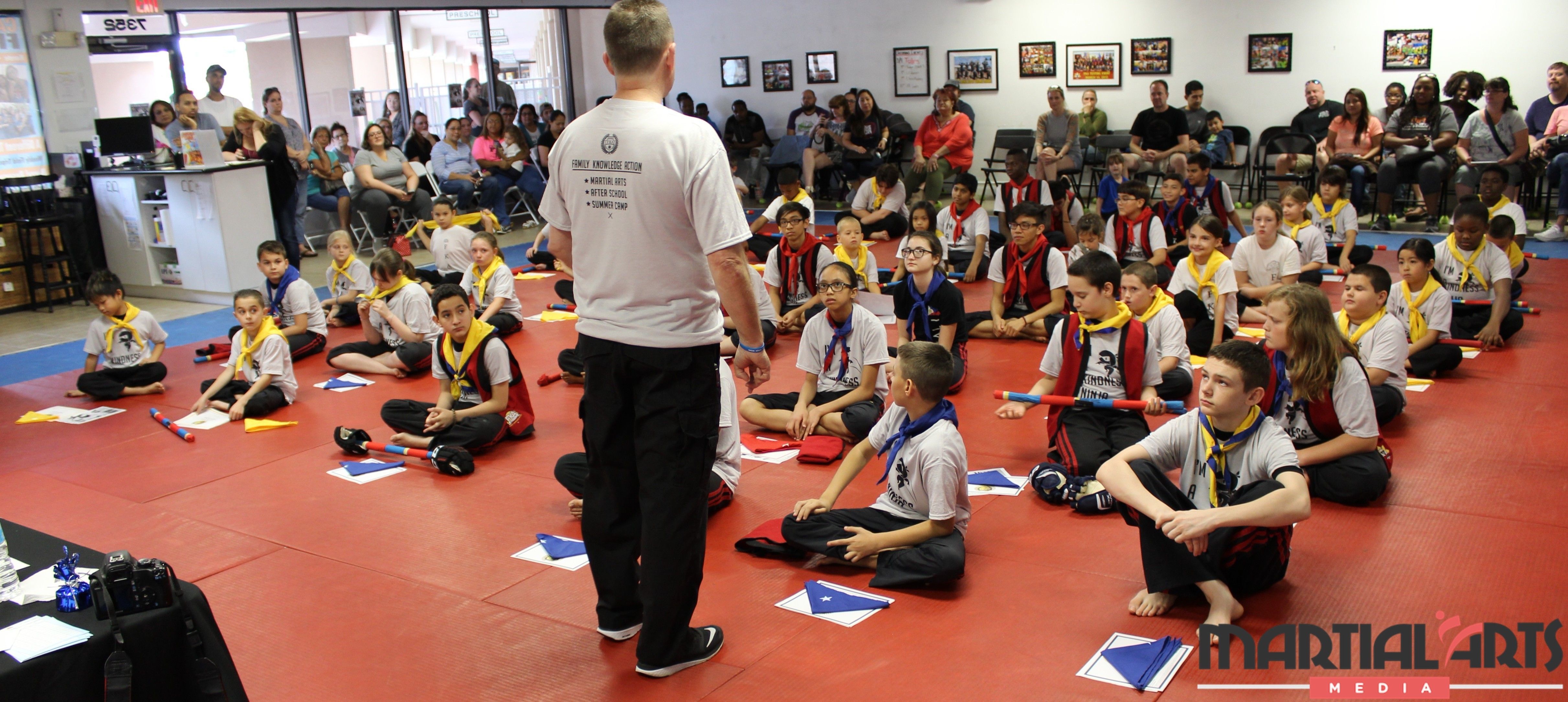
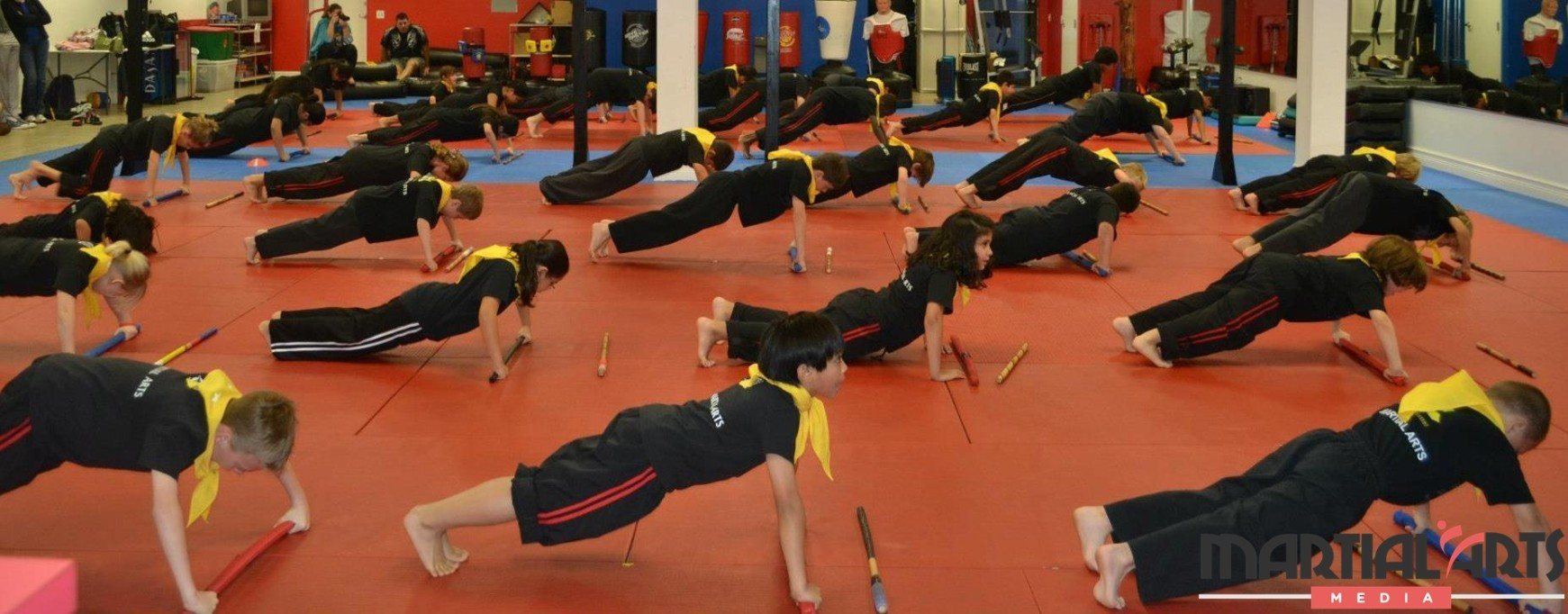


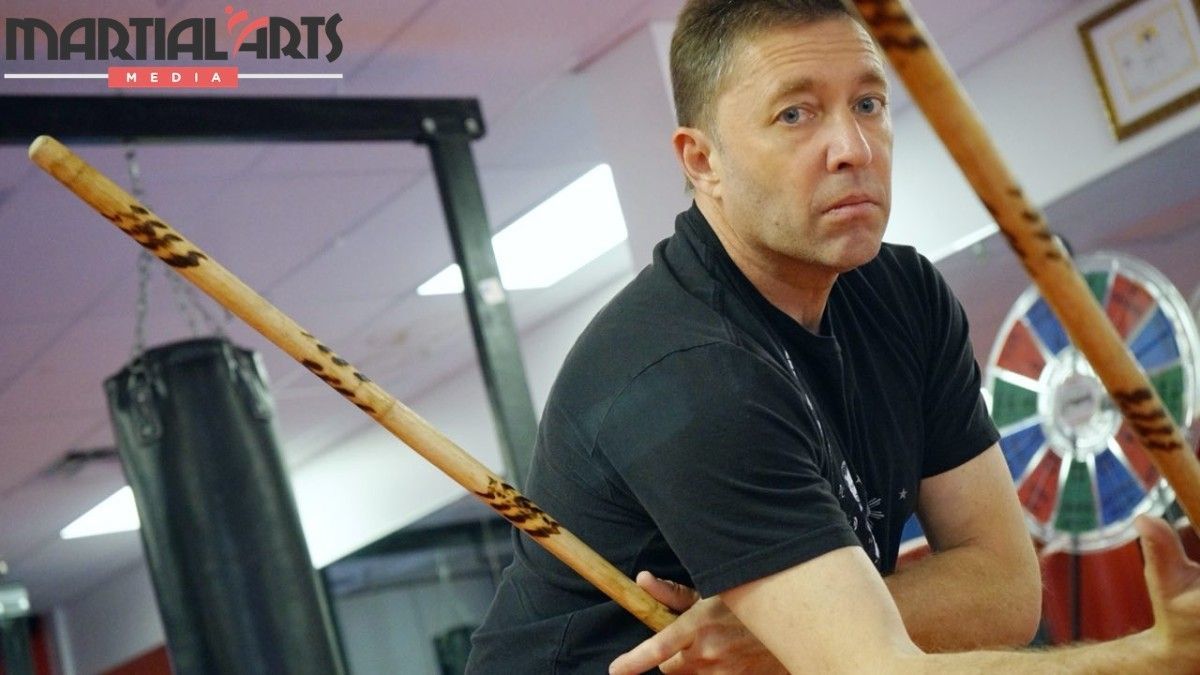



 When I came here, I was passionate about my martial arts. Schooling was my parents’ directive to me more than my own, even though schooling is very important and I did schooling and I recommend everybody does get their schooling and degree, because that's your plan A.
When I came here, I was passionate about my martial arts. Schooling was my parents’ directive to me more than my own, even though schooling is very important and I did schooling and I recommend everybody does get their schooling and degree, because that's your plan A. 
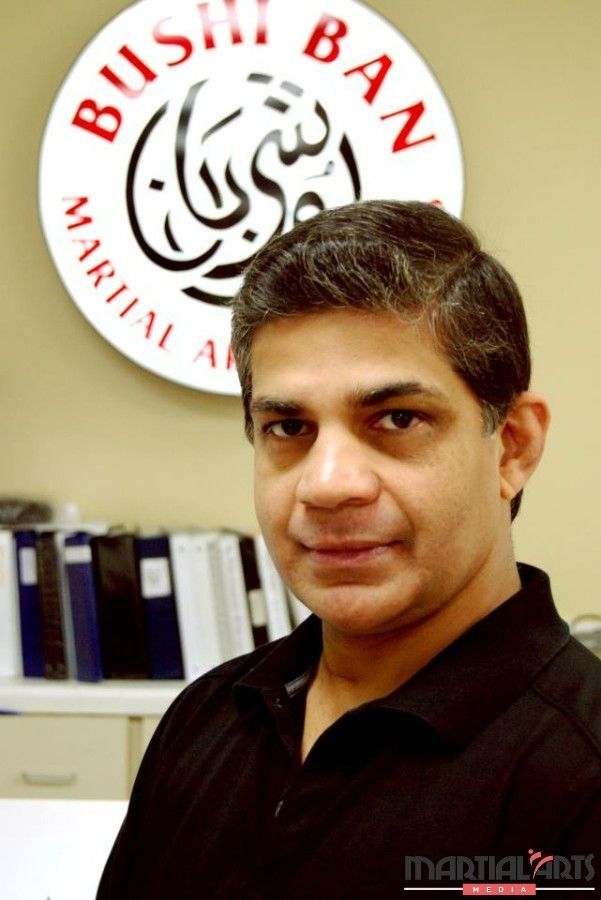 ZULFI:
ZULFI: 
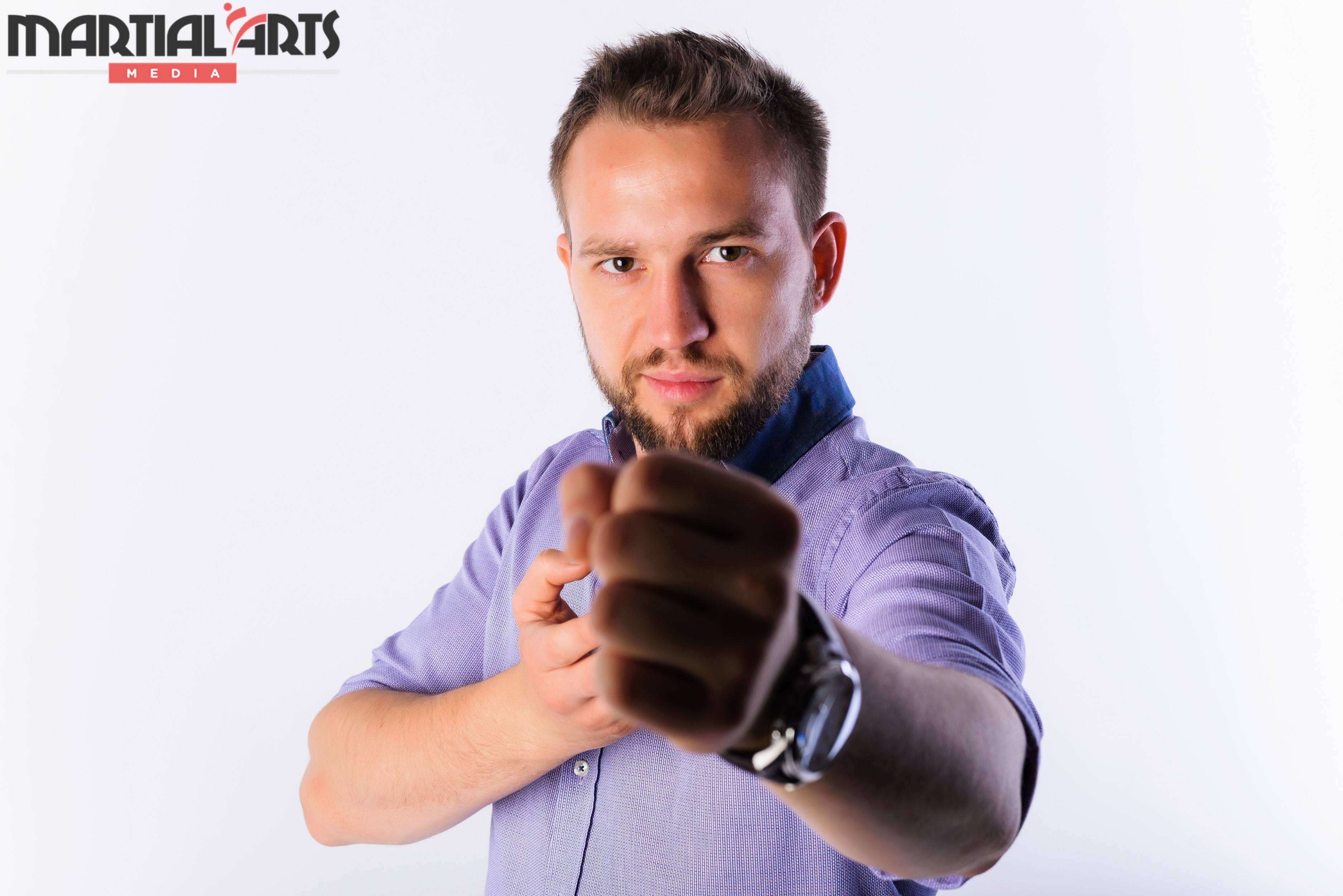
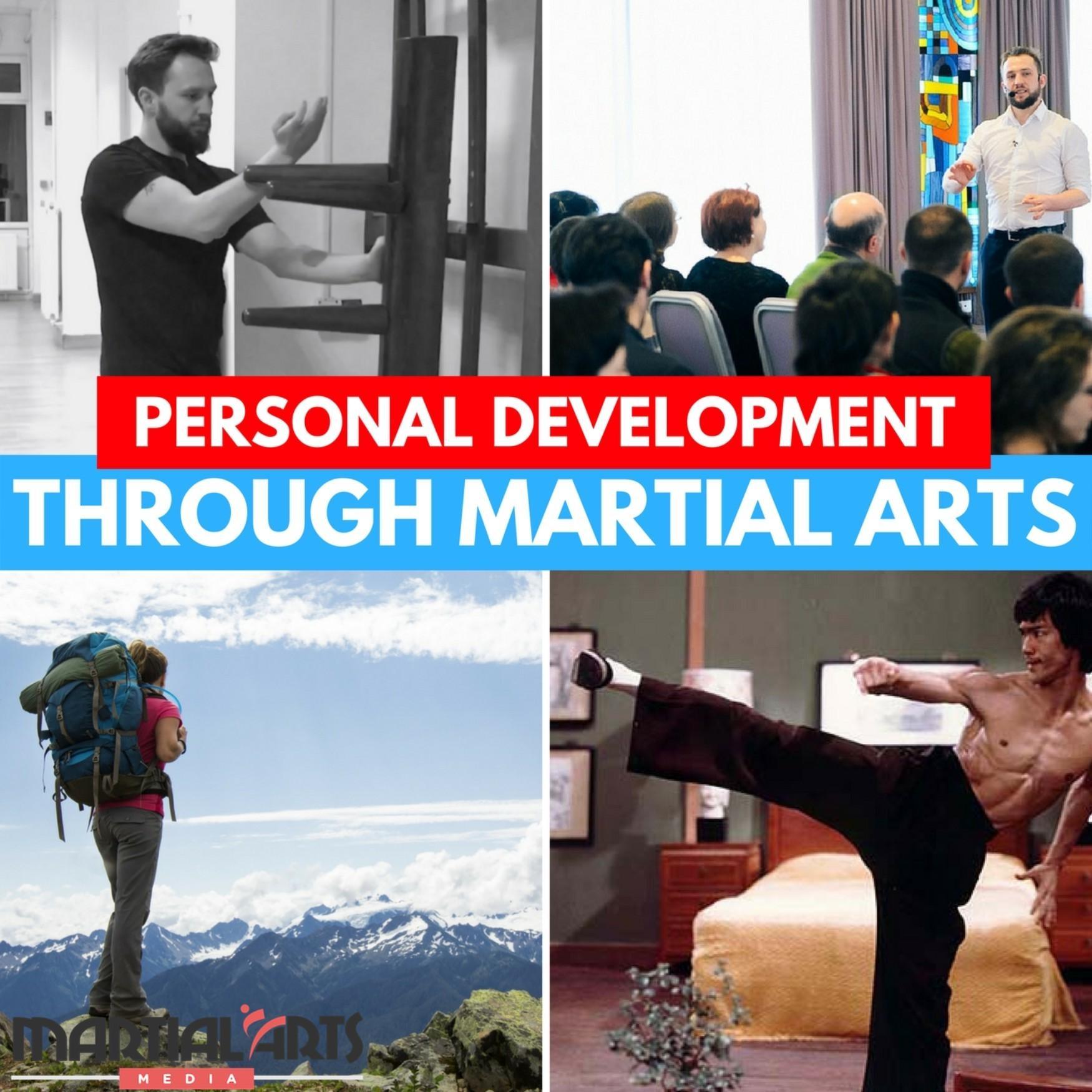
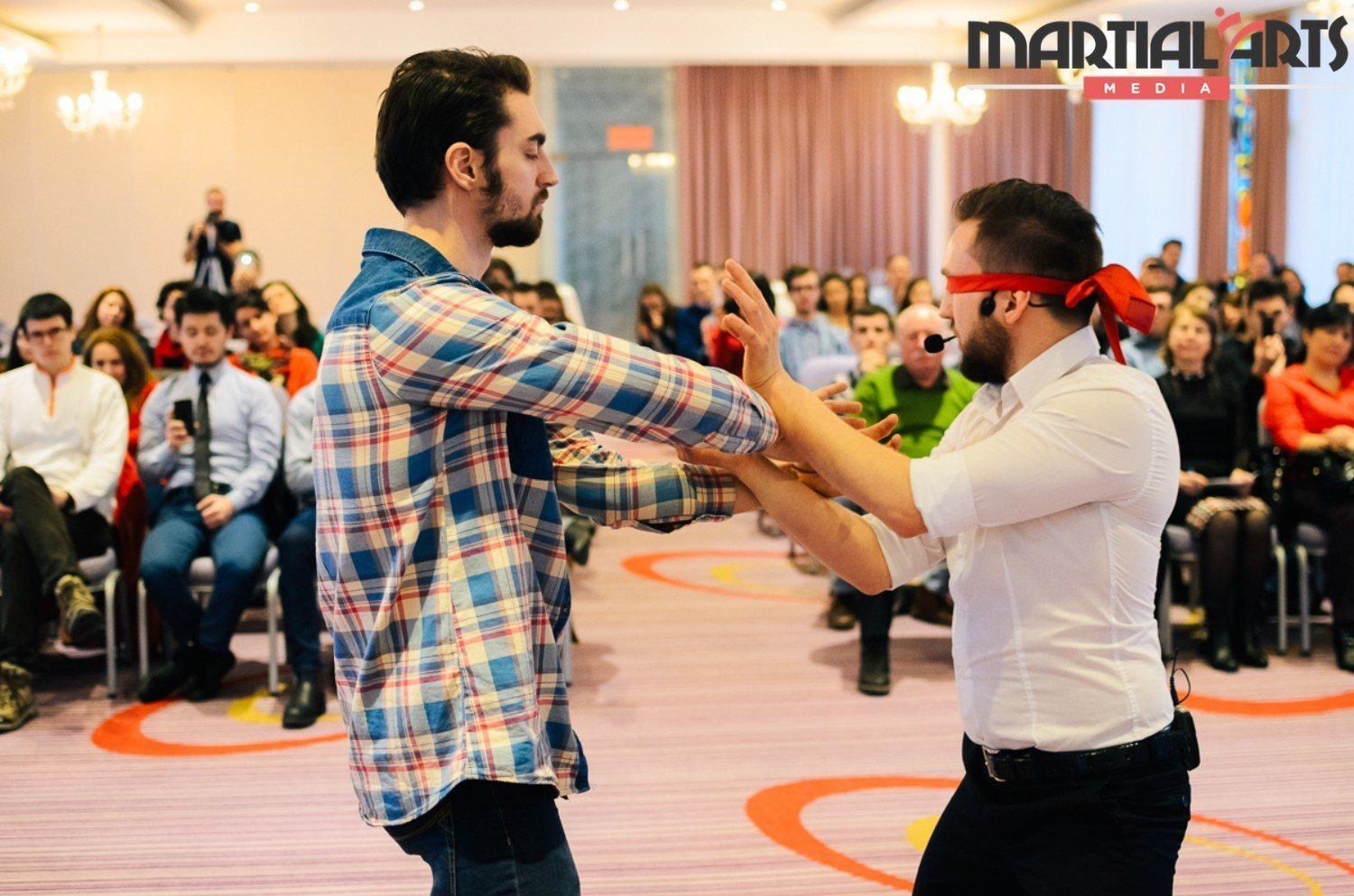
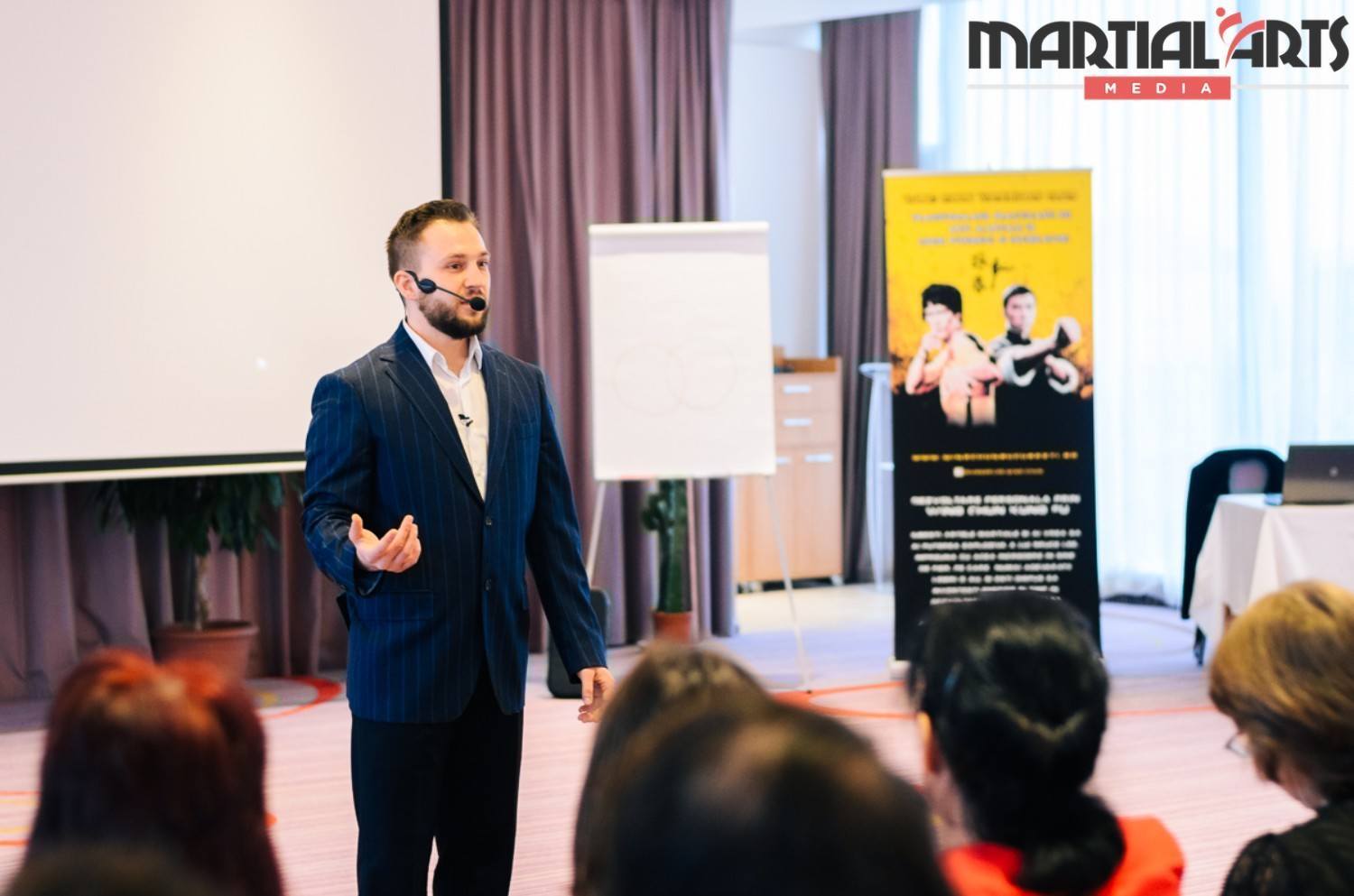
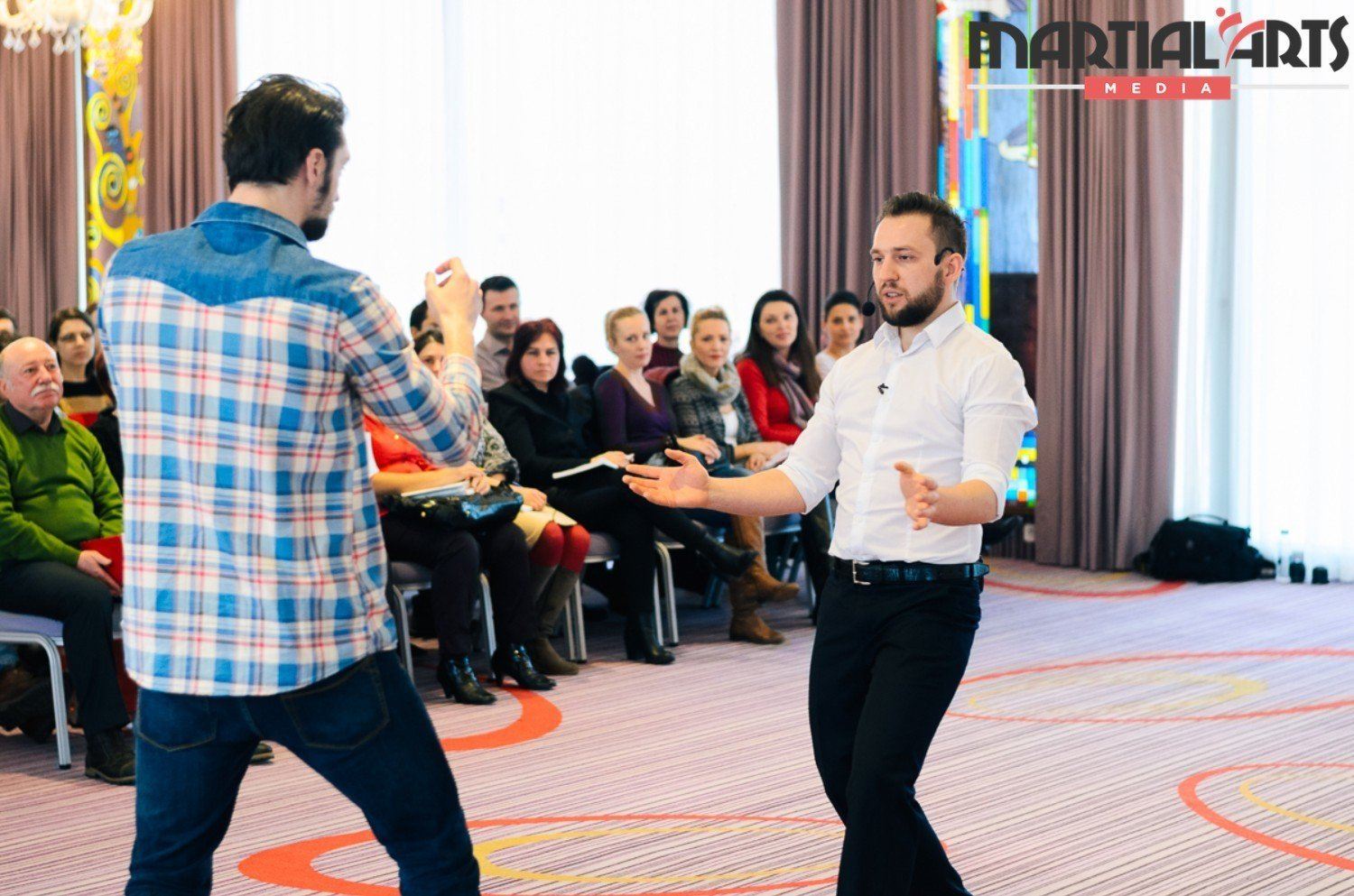
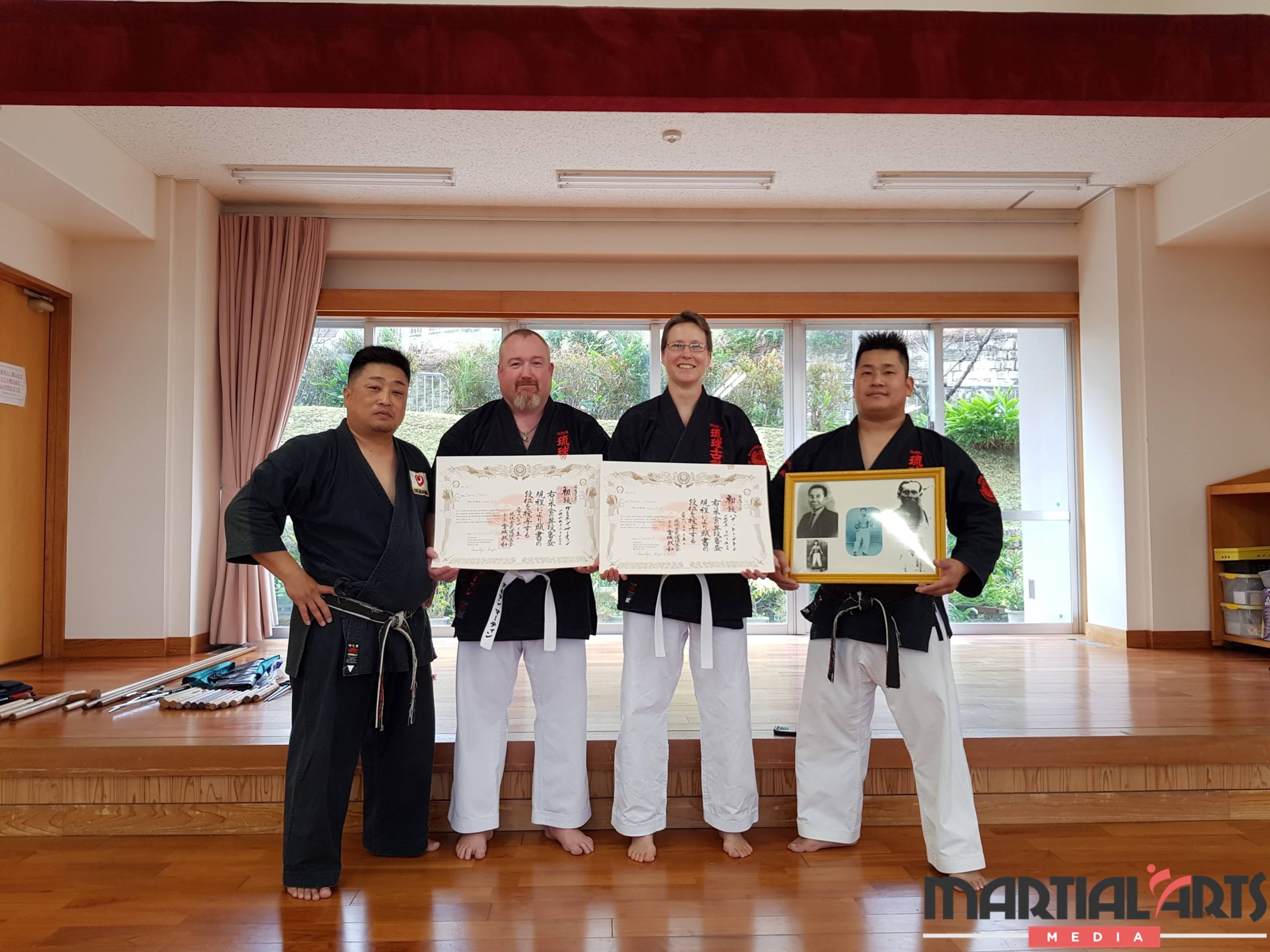
 DAMIEN
DAMIEN